
Cambridge InsideOut - March 7, 2023
Possible Topics:
1) The Gathering Storm - March 6, 2023 Cambridge City Council meeting
2) February Follies - February 27, 2023 Cambridge City Council meeting
3) Boards, Commissions, Task Forces, Advisory Committees
Members Sought for Cambridge Redevelopment Authority Board
Member Sought for Cambridge Community Benefits Advisory Committee
5) A chronology of the 1972 conflict over Proportional Representation in Cambridge
7) An Idea Whose Time Has Come Again - Redress of Grievances
8) Miscellaneous Notes
Peter Valentine: The Fence Speaks for Itself
45th anniversary of moving to Cambridge
9) Looking Ahead at the November Municipal Election
10) Covid Updates
11) The AHO Behemoth Proposal Returns on February 8
12) Catching Up on the (Official) Cambridge News
13) Civic Calendar
Municipal Election Year dynamics are gradually emerging in the form of policy orders, social media chatter, and topics being emphasized or scrupulously avoided. There’s even a chance to chime in on where you stand on the endless state of war that is Rent Control (always an opportunity to turn friends into enemies and enemies into friends). Here are a few agenda items that may prove interesting (possibly in Zoom if the egocentrists of PSL continue to stamp their feet and display their ignorance):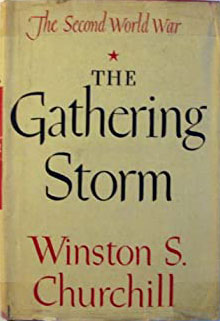
Manager’s Agenda #3. A communication transmitted from Yi-An Huang, City Manager, relative to Policy Order 2022 #181, regarding convening a North Mass Avenue Corridor District Zoning Proposal Working Group.
pulled by Toner; remarks by Toner, Iram Farooq, Carlone on urban design, Nolan, Simmons on outreach and who will Chair committee - Farooq says City staff; Placed on File 8-0-1 (McGovern Absent)
Manager’s Agenda #4. Transmitting Communication from Yi-An Huang, City Manager, relative to the appropriation of $150,000 from Free Cash to the Public Investment Fund Community Development Department Extraordinary Expenditures account to be used for professional services for a planning study for Massachusetts Avenue from Cambridge Common to Alewife Brook Parkway. Funds will be combined with existing balances from prior related projects.
pulled by Carlone; Farooq says $400,000 estimated total cost; Order Adopted 7-0-2 (Azeem, McGovern - Absent)
Manager’s Agenda #6. A communication transmitted from Yi-An Huang, City Manager, relative to Awaiting Report Item Number 22-78, regarding safety concerns at the LBJ Apartment building.
pulled by Simmons; Commissioner Elow responds; Zondervan objects to deploying Police rather than a security service at public housing; Huang notes that private security don't play as engaged a role as Police and commends Cambridge Police; McGovern notes that tenants often let people in building who should not be there; Simmons notes that residents (correctly) equate Police with safety and security; Placed on File 9-0
Manager’s Agenda #7. Transmitting Communication from Yi-An Huang, City Manager, relative to a transfer of $40,000 from the General Fund Reserves Other Ordinary Maintenance account to the General Fund City Council Other Ordinary Maintenance account to cover current and anticipated costs related to the work of the Charter Review Committee.
Order Adopted 9-0
Manager’s Agenda #8. A communication transmitted from Yi-An Huang, City Manager, relative to the City of Cambridge retaining its AAA rating from the nation’s three major credit rating agencies. [S&P] [Moodys] [Fitch]
pulled by Carlone; David Kale (Finance) explain about savings of $1.4 to $2 million interest; McGovern asks about ability to issues bonds, Kale says you can bond anything but the market decides the rates (recently 3.06%); Nolan notes ESG ratings in each of the reports; Toner notes value of stability in staff with change in City Manager, asks about effect of commercial vacancies and possible effects, Kale notes range of revenues and healthy reserves and notes what may happen with office space as leases expire and uses possibly change, $1 billion in new growth last year in lab space, uncertainty in office space (Gayle Willett - Assessing); Azeem about limitations on spending that might occur w/o AAA ratings, Kale explains value of strong and consistent management, long-term capital plan, ongoing leadership and bench strength in financial team, strength of local economy; Huang relates City budget to personal budgets, what might happen if City simply spent a lot more money - financial stewardship and optimization; Azeem notes about trade-off of pay-as-you-go vs. borrowing; Simmons remarks on potential downturn, Kale notes that revenues support expenditures, stable tax rates, managing debt, scheduled to pay off pension liabilities by 2026, more to do with long-term pension liabilities, history of bond ratings from Prop 2½ (early 1980s) until today; Zondervan dismissive of AAA ratings and focuses on the negatives of ESG (environmental, social, and governance) and equity; Kale thanks Manager and Finance team, CDD, and other department heads and staff - echoed by City Manager Huang; Placed on File 9-0
Manager’s Agenda #9. A communication transmitted from Yi-An Huang, City Manager, relative to the Annual Surveillance Report concerning City Departments’ use of Surveillance Technology or Surveillance Data.
pulled by Zondervan (who has issues with Shot Spotter); Reports Approved and Placed on File 9-0
My question is simply this: “How much staff time is occupied assembling these reports?”
Charter Right #2. That the joint Economic Development and University Relations and Neighborhood and Long-Term Planning, Public Facilities, Arts & Celebrations Committees forward the amended proposed Policy Order regarding Labs and Neighborhood Planning to the full City Council. [Charter Right – Zondervan, Feb 27, 2023]
Siddiqui again says this was “charterwritten”; Zondervan amendments Approved 9-0; Order Adopted as Amended 9-0
Charter Right #3. That the City Manager is requested to direct the appropriate City Departments to work with Eversource to include in their annual reporting, updates on their work to move forward with providing the infrastructure required to move Cambridge toward electrifying the city. [Charter Right – Nolan, Feb 27, 2023]
Siddiqui again says this was “charterwritten”; Nolan added as sponsor and McGovern amendments Adopted 9-0; Carlone comments on monopolies like Eversource; Adopted as Amended 9-0
Unfinished Business #4. An Ordinance has been received from Diane P. LeBlanc City Clerk, relative to Emissions Accounting Zoning Petition (Ordinance #2022-20) [Passed to 2nd Reading Dec 19, 2022; To Be Ordained on or after Jan 9, 2023; Expires Mar 6, 2023; Ordinance Amended Feb 27, 2023]
Comments by (Abundant Housing Treasurer) Azeem on embedded emissions accounting such as materials used in construction, proposes amendments exempting some housing; Zondervan prefers version w/o amendments saying it has been fully vetted and that Planning Board wants this accounting for all projects w/o special exemptions for housing; Toner supports Azeem amendments; (Sky is Falling) Carlone says software already out there for embodied emissions accounting and that this is all just common sense and wants version w/o amendments; Nolan now trying to appear as a “moderate” and will support amendments; Siddiqui aligns with Zondervan, Carlone; Azeem amendments Adopted 5-4 (BA,MM,PN,DS,PT - Yes; DC,AM,QZ,SS - No); Ordained as Amended 9-0
Resolution #1. Congratulations to Robert Steck on his retirement from the City of Cambridge. Councillor Toner, Councillor Carlone
pulled by Carlone who lauds Rob Steck as a playground designer and more
Resolution #3. Congratulations to Sam Corda on his retirement from the Cambridge Water Department. Mayor Siddiqui, Councillor Toner, Councillor McGovern, Councillor Simmons
Resolution #4. Resolution on the death of David Leslie. Mayor Siddiqui, Vice Mayor Mallon
Order #3. That the City Manager be and is hereby requested to direct CDD to provide language that would amend the Patrick Barrett et al. North Mass Ave BZ-5 Zoning District Petition to include the amendments proposed by the petitioner and report back to the City Council by Mar 13, 2023. Councillor Zondervan, Vice Mayor Mallon
Order Adopted 9-0
Committee Report #4. The Ordinance Committee, chaired by Councillor Zondervan, met on Feb 28, 2023 to continue the discussion of Citizens Zoning Petition from Patrick Barrett et al. North Mass Ave BZ-5 Zoning District Petition – AP22#52. [text of report]
pulled by Zondervan; Report Accepted, Placed on File 9-0; Passed to 2nd Reading 6-3 (BA,AM,MM,PN,DS,PT - Yes; DC,QZ,SS - No)
Order #4. That the City Council go on record in support of the Tenant Protection Act HD.3922/SD.2368. Councillor Zondervan, Mayor Siddiqui, Councillor Carlone, Vice Mayor Mallon
pulled by Toner; Zondervan notes that this is about rent stabilization and “just cause” evictions; Siddiqui says this is similar to one Council previously supported; Toner will vote NO because he does not want to bring back divisiveness of rent control and observes that this will cause preemptive rent increases and thwart housing production; Nolan wants local control and says that (20 years ago) Cambridge voted overwhelmingly against rent control; McGovern will also support this with double-talk about how this is not actually rent control (which it obviously is); Mallon also double-talks and stresses “local control” rather than what this is really about, lauds Rep. Connolly; Siddiqui adds to the double-talk about “options; Order Adopted 8-1 (Toner NO)
Order #6. That the City Manager is requested to confer with the City Manager’s Housing Liaison, Community Development Department, and the Cambridge Housing Authority [and the City Solicitor] on the feasibility of municipally-funded housing vouchers. Mayor Siddiqui, Vice Mayor Mallon, Councillor McGovern, Councillor Simmons, Councillor Azeem, Councillor Carlone, Councillor Nolan, Councillor Zondervan (PO23#47)
pulled by Simmons; remarks by Siddiqui, Simmons, Mallon about how Somerville is doing this (with ARPA funds) but without any estimate of how costly this would be; Toner asks about legal issues and wants opinion of City Solicitor; Carlone (aggressively) suggests this should be made unanimous; McGovern says this would eliminate homelessness of veterans; Adopted as Amended 9-0
Order #7. That the City Manager is requested to fund the HEART initiative and negotiate a contract for services with HEART, to include but not limited to HEART responding to certain 911 calls. Councillor Zondervan, Councillor Azeem, Mayor Siddiqui, Councillor Nolan
pulled by Nolan; remarks by Zondervan, Nolan; Charter Right - Nolan
Order #8. That the City Manager is requested to confer with the appropriate City departments to ensure multi-family properties on the market are reviewed as quickly as possible as potential affordable housing acquisitions. Councillor Nolan, Mayor Siddiqui, Vice Mayor Mallon
pulled by Nolan; Amendments proposed to add MM,DC; Charter Right - Simmons
Committee Report #1. The Finance Committee conducted a public meeting to discuss the FY24 Capital Budget, and future investment priorities in Cambridge’s physical infrastructure ahead of the FY24 budget cycle. [text of report]
Report Accepted, Placed on File 9-0
Committee Report #3. The Housing Committee met on Wed, Feb 8, 2023 from 12:30-2:30pm to discuss potential amendments to the Affordable Housing Overlay district as outlined in the Nov 21, 2022 policy order adopted by the City Council. [text of report]
pulled by Simmons; remarks by Simmons (meeting recessed, not adjourned, so no public comment), Carlone (NLTP meeting on Mar 22), Azeem says time needed for robust discussion; Report Accepted, Placed on File 9-0
Wed, Mar 8
3:00pm The Housing Committee will hold a public meeting to continue the recessed meeting from Feb 8, 2023 to continue discussing potential amendments to the Affordable Housing Overlay district as outlined in the Nov 21, 2022 policy order adopted by the City Council. No Public Comment.
Tues, Mar 22
5:30pm The Neighborhood & Long-Term Planning, Public Facilities, Arts & Celebrations Committee will hold a public meeting to discuss potential amendments to the Affordable Housing Overlay.
The shortest month will end with possibly the longest snowfall so far this season as the home nine take the field in Sullivan Stadium. Here are the agenda items that drew my interest:
Note: The PSL virus again hit the Cambridge City Council. They are now all in Quarantine, a.k.a. Zoom.
[For those unschooled in Marxism, PSL is the Party for Socialism and Liberation.]
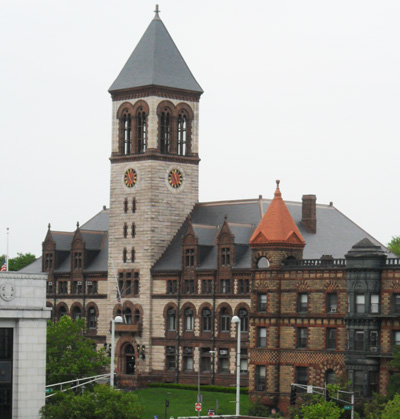
Manager’s Agenda #1. A communication transmitted from Yi-An Huang, City Manager, relative to a public health update.
pulled by Siddiqui; remarks by Derrick Neal, Anna Kaplan; PN,DC(has Covid),QZ,Huang; Placed on File 9-0
Note: This is the 14th day running that the City has failed to provide Covid data. Six messages to those responsible have gone unanswered. I continue to update the figures and charts as best as I can from cumulative totals and I will adjust things if and when the City gets its act together. There have been two new deaths recorded recently but no details are available. This is not the only instance where City staff are falling down lately.
Manager’s Agenda #3. A communication transmitted from Yi-An Huang, City Manager, relative to Awaiting Report Item Number 22-60, regarding streamlining the City’s block party and Play Streets permit requirements.
pulled by Mallon; remarks by Brooke McKenna (TPTD), Iram Farooq (CDD),PN,QZ,DS, Placed on File 9-0
Manager’s Agenda #5. Transmitting Communication from Yi-An Huang, City Manager, relative to the appropriation in the amount of $1,800,000, from Free Cash to the Public Works Public Investment Fund Extraordinary Expenditures account to fund accessibility improvements to City Hall including the reconstruction of Dorothy “Dottie” Doyle Way.
pulled by Carlone; James Wilcox (DPW) addresses mud and erosion along street, plans for EV charging; Simmons notes history of City Hall, need for landscaping; Nolan (02138) thinks Trowbridge Street borders City Hall; Owen O’Riordan says rear entrance will be modified; Order Adopted 9-0
Manager’s Agenda #11. A communication transmitted from Yi-An Huang, City Manager, relative to the appointment of the following persons as members of the Black, Indigenous, People of Color-Owned Business Advisory Committee for a term of two years, effective March 1, 2023: Margaret Pimental, Sukia Akiba, and Keisha Graves.
Order Adopted 9-0
Manager’s Agenda #12. A communication transmitted from Yi-An Huang, City Manager, relative to a report from CDD and the Law Department containing clarifying edits to the Climate Resilience Zoning Petition. [text of report]
pulled by Zondervan; Rules suspended to bring forward Unfinished Business #7; Farooq explains recommended edits and implementation dates; Zondervan asks about dates; Solicitor Nancy Glowa; Jeff Roberts public review period for all those impacted by new standards and regulations; Zondervan moves to add Jan 1, 2024 alternate deadline; Nolan wants a date to be Sept 1, 2023; Amendments Adopted 9-0; Ordained as Amended 9-0; Communication Placed on File 9-0
Unfinished Business #7. An Ordinance 2022 #9 has been received from Diane LeBlanc City Clerk, relative to create a new Section 22.80 Flood Resilience Standards. [Passed to 2nd Reading Feb 6, 2023; To Be Ordained on or after Feb 27, 2023; Expires Apr 26, 2023]
pulled by Zondervan, Rules Suspended; Ordained as Amended 9-0
Manager’s Agenda #13. A communication transmitted from Yi-An Huang, City Manager, relative to PO22#314, PO22#315, and PO22#316 from the meeting of 12/19/2022, regarding the Emissions Accounting Petition. [text of report]
pulled by Zondervan; Rules suspended to bring forward Unfinished Business #5; Zondervan motion to adopt recommended amendments, Amendments Adopted 8-0-1 (DS Absent); Azeem raises issues of cost impacts; Suzanne Rasmussen (CDD) says she has no estimate for costs; Azeem requests more clarity on financial impacts; Farooq suggests costs would be modest; Rasmussen suggests more regulations to come; Azeem frustrated by these responses - and skeptical, wants more comprehensive view of total cost or layered regulations; McGovern concurs, notes disparate impact on smaller developers; Regulatin’ Rasmussen remains stone-faced, cares only about reporting format and not about cost; Toner echoes concerns about cumulative cost impacts, prefers to wait until costs better known; Zondervan dismissive of cost concerns, suggesting possible cost savings; Carlone says not to worry - not a dramatic thing, says problems and costs likely reduced, reiterates his dislike for glass, says “time is running out folks”; Nolan says pass it now and worry about the details later, suggests builders could tap into federal funding; Siddiqui suggests waiting a week; Simmons calls out Nolan on assertions that she has “talked to developers”; Azeem asks how many votes needed (answer = 6), suggests waiting until next week; Zondervan agreeable to waiting; Referred to Petition 9-0
Manager’s Agenda #14. A communication transmitted from Yi-An Huang, City Manager, relative to Awaiting Report Item Number 23-1, regarding a legal Opinion on whether the Barrett, et al. petition would need to be refiled should there be a Letter of Commitment attached to the rezoning, and whether the Barrett, et al. petition constitutes “spot zoning.” [text of report]
pulled by Zondervan; Solicitor explains vulnerability to challenge due to lack of a recent planning study, if adopted; Referred to Petition 9-0; Zondervan moves Reconsideration on all votes so far (hoping the same will not prevail), Reconsideration Fails 0-9
Manager’s Agenda #15. A communication transmitted from Yi-An Huang, City Manager, relative to the 2023 Goals and Metrics for the Annual City Manager Performance Review. [text of report]
pulled by Mallon; Mallon proposes amendments from AM+PN who want annual performance review for all City employees; McGovern wants to claify that this should not include School Department employees; City Manager wants to cover only non-union City employees; Simmons concurs that this should not include School Department employees; one proposed amendment dropped; 2nd amendment adopted 8-0-1 (PT Absent); Amended Goals Adopted 8-0-1 (PT Absent)
Manager’s Agenda #16. A communication transmitted from Yi-An Huang, City Manager, relative to relative to a request to move to Executive Session to discuss the purchase, exchange, lease or value of real property as discussion in an open meeting may have a detrimental effect on the negotiating position of the public body.
pulled by Siddiqui; Executive Session held; Communication Placed on File 9-0
Charter Right #1. That the City Manager is requested to confer with the appropriate departments and agencies to ensure the continuation of Riverbend Park closures on Saturdays and Sundays. [Charter Right – Simmons, Feb 13, 2023]
Azeem amendments; Simmons appreciates but will vote against Order; Nolan claims “overwhelming” support (based on what?) and claims that “the community has spoken loud and clear” and suggests that only a tiny minority objects - she fails to understand the bias of “voluntary response” when a petition is circulated by one faction; Toner regrets that a full compromise not reached; Amendments adopted 9-0; Order Adopted 7-2 (Simmons, Toner - NO)
Charter Right #2. Policy Order Regarding Police Details. [Charter Right – Zondervan, Feb 13, 2023]
Order Adopted as Amended 9-0
On The Table #3. That the City Manager is requested to look into the feasibility of automated traffic enforcement in Cambridge as well as using unarmed CPD traffic details for future discussion Automated/Unarmed Traffic Enforcement. [Charter Right – Toner, Feb 6, 2023; Tabled – Azeem, Feb 13, 2023]
Remove from Table (Toner) 9-0; Amendments (Toner) to remove all references to police details to make Substitute Order; Azeem prefers original Order; Zondervan says three issues - road construction details, traffic stops, and automated enforcement - wants to retain references to traffic stops; Nolan objects to amendments - says “data is very clear” about unconscious bias and racial profiling; Carlone feels two issues need to be separated - traffic cameras and traffic stops, will vote for amendments; McGovern agrees - all for traffic cameras, skeptical about taking traffic enforcement away from police, wonders how it would work otherwise, will support Toner's amendments; On Toner’s Substitute Order – Fails 4-5 (DC,MM,DS,PT-Yes; BA,AM,PN,QZ,SS-No); Add Nolan as sponsor 6-0-0-3 (MM,DS,PT-Present); On Original Order – Adopted 5-1-0-3 (BA,AM,PN,QZ,SS-Yes; PT-No; DC,MM,DS-Present)
Unfinished Business #6. An Ordinance has been received from Diane P. LeBlanc City Clerk, relative to Ordinance 2022-2 Chapter 2.02 entitled “City Council”. [Passed to 2nd Reading Feb 6, 2023; To Be Ordained on or after Feb 27, 2023]
Ordained 9-0
Unfinished Business #4. That the Ordinance Committee refer Categories M (Shared Vehicle) and N (Publicly-accessible, Privately-owned Electric Vehicle Charging System) of the Cambridge Transportation Decarbonization and Congestion Mitigation Bill, along with definitions, to the full City Council with a favorable recommendation. Ordinance #2022-13 as Amended. [Expired Sept 27, 2022]
pulled by Zondervan, Placed on File 9-0
Applications & Petitions #1. A Zoning Petition Has been received from Craig Kelley regarding Cambridge Transportation Emissions and Car Sharing Act.
Referred to Planning Board & Ordinance Committee 9-0
Lotsa (103) Communications - including 14 protests from Harvard Square property owners opposed to the Blier, et al. Zoning Petition. Other significant topics are Memorial Drive weekend closures and BEUDO.
Resolution #3. Resolution on the death of Marion A. (Colarusso) Sullivan. Councillor Toner, Councillor Simmons, Councillor McGovern
pulled by Toner, Simmons; remarks by Councillor Simmons
Order #1. In support of HD. 3252 and SD. 2006, An Act to Promote Yes In My Backyard. Councillor McGovern, Councillor Simmons, Vice Mayor Mallon, Councillor Azeem
pulled by Nolan; remarks by Nolan with concerns that it may affect Cambridge’s Inclusionary Zoning Ordinance; Order Adopted 8-0-1 (DC Absent)
Order #2. That the Petition from Suzanne P. Blier, et.al Harvard Square Zoning Petition as amended be sent to the full City Council with no recommendation. Councillor Zondervan
pulled by Zondervan; McGovern notes his opposition to petition; expires March 14, but McGovern wants to kill it now; QZ suggests moving it to 2nd Reading hoping it will be voted down; Toner notes that it has a positive recommendation from Planning Board, hopes a compromise can be reachjed with HSBA, will vote it down; Nolan wants to look at this issue citywide; Order Adopted 7-1-1 (DS-No; DC-Absent); Mallon moves Petition to 2nd Reading (hoping it will fail) - Fails 2-6-1 (PN,QZ-Yes, BA,AM,MM,DS,PT,SS-No, DC-Absent); Reconsideration Fails 0-8-1 (DC-Absent)
Committee Report #4. The Ordinance Committee met on Feb 14, 2023, and voted favorably to send the Suzanne P. Blier, et.al Harvard Square Zoning Petition as amended to the Full City Council with no recommendation. [text or report]
Report Accepted, Placed on File 8-0-1 (Carlone Absent)
Order #3. That the joint Economic Development and University Relations and Neighborhood and Long-Term Planning, Public Facilities, Arts & Celebrations Committees forward the Callender Petition and PO22#161 to the full City Council with a negative recommendation. Vice Mayor Mallon
pulled by Toner; Zondervan hopes that petition will not be voted down as it may prevent any action on any laboratory ban for two years, prefers to let it expire, says a negative recommendation will be a “rebuke” to low-income tenants; McGovern notes that link between a lab ban and affordable housing production is a fallacy; Azeem sympathetic to petitioners, but will vote for negative recommendation; Zondervan says there is a direct connection between allowing labs and precluding housing in Squares; Order Adopted 7-1-1 (QZ-No; DC-Absent); Toner moves to pass to 2nd reading – Fails 1-7-1 (QZ-Yes; BA,AM,MM,PN,DS,PT,SS-No; DC-Absent)
Order #4. That the joint Economic Development and University Relations and Neighborhood and Long-Term Planning, Public Facilities, Arts & Celebrations Committees forward the amended proposed Policy Order regarding Labs and Neighborhood Planning to the full City Council. Councillor Toner
pulled by Toner; Charter Right - Zondervan
Committee Report #3. The Economic Development and University Relations & Neighborhood & Long-Term Planning, Public Facilities, Arts & Celebration Committee conducted a public meeting on Feb 7, 2023 at 3:00pm to continue its Dec 7, 2022 discussion of the attached zoning amendments and the Callender citizen petition proposing a technical definition of lab use and a restriction on new instances of the lab use in fragile districts including Central Square, Harvard Square, and Cambridge Street and possible alternative recommendations to address neighborhood concerns. [text or report]
Report Accepted, Placed on File 8-0-1 (Carlone Absent)
Order #5. That the City Manager is requested to direct the appropriate City Departments to work with Eversource to include in their annual reporting, updates on their work to move forward with providing the infrastructure required to move Cambridge toward electrifying the city. Councillor McGovern, Councillor Toner, Vice Mayor Mallon
pulled by McGovern; remarks by Nolan, Zondervan, McGovern; Proposed amendment by McGovern; Charter Right - Nolan
Order #6. That a Roundtable be held on Mon, Mar 13, 2023, from 5:30pm to 7:30pm in the Sullivan Chamber in place of the Regular City Council Meeting, for the purpose of receiving an update on the Municipal Broadband Feasibility Study. Mayor Siddiqui
Order Adopted 8-0-1 (DC Absent)
Committee Report #2. The Economic Development and University Relations Committee conducted a public meeting on Jan 24, 2023, at 3:00pm to continue its Nov 22, 2022 discussion of the environmental and economic impact of BEUDO on residential, business, and academic properties/communities. This will be a roundtable discussion with the Community Development Department, representatives from Eversource, the business community, universities, and large commercial/residential property owners. [text or report]
Report Accepted, Placed on File 8-0-1 (Carlone Absent)
Committee Report #5. The Ordinance Committee met on Feb 15, 2023, and voted favorably to send the proposed Ordinance #2022-6, Green Jobs, as amended to the Full City Council with a favorable recommendation to Pass to a 2nd Reading. (Ordinance #2022-6, Green Jobs) [text or report]
Report Accepted, Placed on File, Passed to 2nd Reading 8-0-1 (Carlone Absent)
Mar 6, 2023 – Cambridge City Manager Yi-An Huang seeks candidates for consideration for the Cambridge Redevelopment Authority Board (CRA). The CRA is an independent public body focused on publicly-beneficial real estate projects and infrastructure investment within the City of Cambridge.
The mission of the CRA from its 2014 Strategic Plan states “the Cambridge Redevelopment Authority is committed to implementing imaginative, creative development that achieves social equity and environmental sustainability. Our goal is to work in the public interest to facilitate infrastructure investments and development projects that integrate commercial, housing, civic, and open space uses. We are a public real estate entity with a unique set of redevelopment tools, working in close partnership with the City of Cambridge and other organizations.”
In 2012, under the guidance of a newly appointed Board, the CRA launched a strategic planning process which developed the mission above, along with a guiding set of operating principles, from which the organization initiated a series of new redevelopment activities for the community. Since then, the CRA launched the Foundry Redevelopment Demonstration Project, amended the Kendall Square Urban Redevelopment Plan (KSURP), initiated the Forward Fund nonprofit grant program, initiated multiple park and streetscape improvement projects, and purchased and renovated the nonprofit office building at 99 Bishop Allen Drive.
The CRA is finalizing a new strategic plan that deepens its commitment to equity and sustainability through community infrastructure projects, affordable housing investments, and economic opportunity programs. This strategic plan requires that the CRA be both nimble and thoughtful in taking on new projects and initiatives. Anticipated efforts for the upcoming years include the development of affordable homeownership opportunities, the preservation and renovation of commercial and non-profit spaces that advance economic opportunity, and the support of vital community infrastructure including community facilities, open space, and transit. The CRA Board will be responsible for the deployment of its financial resources and establishing partnerships to implementation of imaginative redevelopment programs.
Per the state regulations creating redevelopment authorities (M.G.L. 121B), the CRA Board is composed of five members, four of whom are appointed by the City Manager and confirmed by the City Council to five-year terms. The fifth member is appointed by the Governor’s office. The CRA Board is a public body that meets at least monthly under the guidance of the Open Meeting Law of the Commonwealth of Massachusetts. Regular board meetings are currently held virtually on the second or third Wednesday of each month, from 5:30-8:30pm.
Board members are responsible for overseeing the fiscal management and strategic direction of the CRA. They oversee project selection, program policy, internal controls, contracting and procurement decisions, and general management of operations. The Board hires the Executive Director and sets annual budgets for the organization. They serve as a critical connection between community interests and program management. They bring forward redevelopment concepts for consideration. They review suggested initiatives received from the City of Cambridge and CRA staff. They guide existing redevelopment programs providing land use and design review of buildings in the KSURP area of Kendall Square. They monitor the delivery of ongoing community benefit agreements in Kendall Square and other plan areas.
The City of Cambridge is committed to advancing a culture of antiracism, diversity, equity, and inclusion. All board and commission members in Cambridge must have the ability to work and interact effectively with individuals and groups with a variety of identities, cultures, backgrounds, and ideologies. Women, minorities, veterans, members of the LGBTQ+ community, and persons with disabilities are encouraged to apply.
Additional information regarding the Cambridge Redevelopment Authority is available on the project webpage, www.cambridgeredevelopment.org.
The deadline for submitting applications is Monday, April 3, 2023. Applications can be submitted to City Manager Yi-An Huang using the City’s online application system at cambridgema.gov/apply. A cover letter and resume, or an overview of relevant experience, can also be submitted during the online application process. Paper applications are available in the City Manager’s Office at Cambridge City Hall, 795 Massachusetts Avenue. For more information, call the City Manager's Office at 617-349-4300.
Mar 6, 2023 – Cambridge City Manager Yi-An Huang is seeking to fill a vacancy on the City’s Community Benefits Advisory Committee. This Committee makes recommendations to the City Manager for the approval and awarding of grant agreements with nonprofit organizations for the provision of Community Benefits.
Community Benefits may be programs or services provided by nonprofit organizations that directly benefit Cambridge residents. The role of the Committee is to solicit and evaluate applications from local non-profit providers for the provision of services that are consistent with the Cambridge City Council’s Funding Priorities. The Committee is also responsible for establishing rules, regulations, and guidelines to provide for the proper administration and implementation of Community Benefit funding.
In 2020, the Committee recommended funding for four Partnerships to work with low-income families to address housing stability, financial stability, and behavioral health issues. Those Partnerships will be entering their 4th year of funding. The Committee will be focusing on the evaluation of the Community Benefits Projects, and the Committee’s work as well as supporting the Partnerships in planning for the future.
The Committee’s 13 members represent non-profit organizations, City staff members, Cambridge residents, the Cambridge Community Foundation, the business/property development community, the city’s universities, and the Cambridge Nonprofit Coalition. One seat is currently open for a Cambridge resident, who would serve a 3-year term. The Committee currently meets virtually on the first Monday of the month, from 4-6pm, though the schedule may sometimes change to accommodate Committee needs. In the future, meetings may transition to hybrid format to include in-person.
Individuals with interest in human service programs, experience/expertise in relevant topics (examples include but not limited to nonprofit leadership, fiscal management, community development, program design/development, public health, housing, homelessness, food access/insecurity, mental health/substance abuse, grant writing, social justice, child development), and a demonstrated ability to work effectively with diverse viewpoints to craft consensus solutions are encouraged to apply.
The City is committed to advancing a culture of antiracism, diversity, equity, and inclusion. All committee members in Cambridge must have the ability to work and interact effectively with individuals and groups with a variety of identities, cultures, backgrounds, and ideologies. Women, minorities, veterans, members of the LGBTQ+ community, and persons with disabilities are encouraged to apply.
Applications to serve on the Commission should be submitted by Monday, April 3, 2023 using the City of Cambridge’s online application system at cambridgema.gov/apply. A cover letter and resume or applicable experience may be submitted during the online application process. Paper applications are available in the City Manager’s Office at Cambridge City Hall, 795 Massachusetts Avenue.
I would like to informally gather a group of concerned Cambridge residents to form a Study Group to better understand the Cambridge City Charter - past, present, and future - in detail. What are the strengths and weaknesses of the current Charter? How did we come to have the current (Plan E) Charter? What improvements to the governmental form and election methods might be advisable? [References]
This Study Group would be separate from the “official” Cambridge Charter Review Committee that was recently appointed by several city councillors. Among other things, this group can monitor the official review committee, discuss and critique any proposals coming from that committee, and independently propose alternatives. If you are interested, please let me know. - Robert Winters
5:30-7:30pm Charter Review Committee Virtual Meeting #13 (Zoom)
Note: The fact that the requirement for Charter Review is part of the revised Plan E Charter means that appointments to the committee should have been made by the City Manager subject to review by the full City Council. Instead, all of the appointments were made by an ad-hoc group of 4 councillors without any review of the full City Council. Archived recordings of virtual meetings are available here. The official site is: cambridgema.gov/charterreview
A chronology of the 1972 conflict over Proportional Representation in Cambridge
Senate Next? House Votes To Kill PR
Cambridge Chronicle, March 2, 1972
In a legislative surprise, the House of Representatives passed a bill Tuesday afternoon that would abolish the proportional representation method of voting, unique in this country to Cambridge. The bill, passed on a voice vote, now goes before the Massachusetts Senate next week. Representative Thomas (Hap) Farrell, of Worcester, and former Representative Charles McGlue, of Boston, submitted the bill. Last year, a similar bill passed the House but was defeated in the Senate. Cambridge Representative Thomas H. D. Mahoney said the question of retaining or abolishing PR was for the city to decide under the Home Rule amendment. Four times in the past, Cambridge voters have opted to retain PR when the matter has appeared on the city ballot.
PR Wobbles on Last Legs on the Hill
Cambridge Chronicle, March 9, 1972
Cambridge’s unique Proportional Representation system of voting was wobbling on its last legs on Beacon Hill this week after receiving all but the final death blow from the State Legislature. The Senate Tuesday voted 18-10 not to reconsider its earlier vote to abolish PR. Monday, the Senate had given initial approval of the move to kill PR on a 17-8 vote. The bill, which was passed by the House last week, now goes to the Senate’s Committee on Bills for a Third Reading where it will be checked for form. From there, it will go back to the Senate floor for approval. Then, the bill goes back to the House for enactment and returns to the Senate for final enactment. The bill is expected to be on Governor Sargent’s desk for his signature sometime this week. Supporters of the bill to abolish PR, including Senators Francis X. McCann and Denis L. McKenna, charged that PR voting violates the U.S. Supreme Court’s “one man, one vote” rule. Opponents of the bill said that the issue was for Cambridge residents to decide under the Home Rule amendment to the State Constitution. Senate debate on the bill was highlighted by the surprising opposition of legislators representing areas outside Cambridge. Senator Irving Fishman, Democrat, of Newton, argued that passage of the bill would violate Home Rule. Senator John Parker, Republican of Taunton, said no Cambridge residents had co-sponsored the bill. But Senators McCann, McKenna and Mario Umana supported the bill. McKenna told the Chronicle he questioned whether PR is constitutional. “The Supreme Court has called for one man one vote, but you don’t get this under PR,” he said. He said, however, “I don’t like pushing this down the throats of residents and if PR is constitutional the City Council should have the final say on whether PR is used.”
Let Cambridge Decide
Cambridge Chronicle Editorial, March 9, 1972
If the Legislature, as is expected, gives its final approval to the bill to abolish Proportional Representation voting, we hope that Governor Sargent will veto it. We feel that this would be an appropriate and logical step for the Governor since there are questions of whether, under the Home Rule amendment, the Legislature should pass a bill which tells one city how to elect its municipal officials. Although the bill calls for the repeal of the general law allowing PR and is not, in its wording, aimed specifically at Cambridge, this is the only city which will be affected by its passage. Cambridge is the only city in the country which uses PR to elect City Council and School Committee officials. Retaining this system should be left up to the citizens in Cambridge and not the State Legislature. In both the House and Senate votes on the PR issue during the past two weeks, many legislators were absent. That's understandable. Why should legislators from Saugus, or Fall River or any community outside Cambridge care what method of voting is used in this city? We are not arguing the concept of PR itself here. At this point in the discussion of the Legislature's action, we feel the issue is not whether PR is good or bad, but rather who should decide on its merits. Five times since PR was first adopted by the city in 1941 Cambridge voters have approved this system in local referendums. The last referendum, in 1965, resulted in a 2,536 margin in favor of keeping PR. We feel it may well be time for another referendum, and we would support a movement to put PR before Cambridge voters once again either in a special election or the next municipal election. The Council could vote to put PR on the ballot. Failing that, six percent of the registered voters could sign a petition to have PR on the ballot in the next municipal election. Twelve percent would be needed to hold a special election on the question of PR. The point is it’s the option of Cambridge voters to decide the fate of PR since this is the only city which has it.
Compromise Sought In PR Repeal Bill; Referendum is Key
Cambridge Chronicle, March 16, 1972
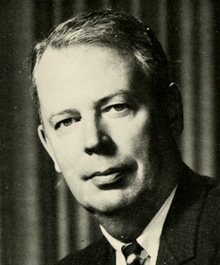 Thomas H.D. Mahoney |
Cambridge residents may still get a chance to vote on whether they want to retain Proportional Representation voting in spite of assaults against PR on Beacon Hill.
Representative Thomas H.D. Mahoney Tuesday got the blessing of House Speaker David Bartley to submit a compromise amendment to the bill to repeal PR which would hinge the effective date of bill on a local referendum.
Under Mahoney’s amendment, the repeal would not take effect until approved by voters in a referendum here.
Mahoney said that Representative Thomas Farrell, of Worcester, who submitted the bill to repeal PR, had tentatively agreed to the compromise.
“I am not arguing the merits of PR,” Mahoney told his House colleagues Tuesday. “It is conceivable that the system has outlived its usefulness. The issue is who should make the decision to keep it (PR) or abandon it. In my opinion, the time may well be here that a popular referendum should be held... it is the option of the voters of Cambridge to decide the fate of PR since this is the only city which uses this method of election.”
Mahoney hopes to submit his amendment to the House next Monday.
The House last Monday voted to enact the repeal of PR into law. Mahoney, however, moved reconsideration of the vote.
Reconsideration will be voted on Monday, and if it passes Mahoney will submit his amendment. Between 11am and 1pm Tuesday, Mahoney button-holed about 40 representatives to get their support to pass reconsideration so he could submit his amendment.
Mahoney said that “abolition of PR is not your (the House) prerogative” because of the Home Rule amendment to the State Constitution.
“This should be left up to the citizens of Cambridge not the Legislature,” he said.
Representative Charles Flaherty, also of Cambridge, told the Chronicle Tuesday that he would “have no problem” supporting Mahoney’s amendment “as long as I can be sure that the amendment requires a referendum and that citizens would not have to petition to get PR on the ballot”.
Flaherty originally supported the repeal of PR when it first reached the House floor February 29.
“I have opposed PR voting since I have been in the House,” Flaherty said, “and I base my opposition on philosophical grounds.”
He said the majority of the voters don’t understand PR and that PR can “dilute” the effect of votes. “In some instances, a minority can rule the majority under PR,” he said.
In the Senate, Senator Francis X. McCann told the Chronicle Tuesday that if the language of the amendment is clear, “if it doesn’t leave an opening where at a later date someone could claim the amendment was a violation of Home Rule,” he would vote for it if it reached the Senate.
He said he would have to read the amendment first, however. McCann originally supported the repeal of PR when the bill reached the Senate floor last week. To be sent to the Governor, the bill would have to be voted on again in the Senate, this time for enactment.
Mahoney’s amendment may be on the bill when it reaches the Senate floor.
The Amendment is Needed
Cambridge Chronicle Editorial, March 16, 1972
We support Representative Thomas H. D. Mahoney’s efforts to strike a compromise in the Legislature’s moves to repeal Proportional Representation voting.
Mahoney’s amendment requiring Cambridge voters’ approval via a referendum before the repeal of PR could take effect should gain wide support in both the House and Senate.
Legislators will be hard pressed to justify a vote opposing such a requirement, especially if they ever want to proclaim the peoples’ right to make decisions on issues which affect them.
The amendment is perhaps the safest way to assure that the decision on retention or abolition of PR will be left up to Cambridge voters.
To allow the repeal to be passed without the referendum requirement, hoping for either a Gubernatorial veto or court decision in favor of a PR referendum is to play a risky game. Neither the veto nor the favorable court decision are assured. The amendment to be offered by Mahoney does assure Cambridge will have the deciding voice on the fate of PR.
As Mahoney said on the House floor, interfering with the affairs of one city will place the Home Rule amendment in jeopardy. Cambridge will be the victim this time, but any of the other cities or towns in the Commonwealth could be the victim the next time.
House Okays PR Compromise
BY PAUL E. TEAGUE
Cambridge Chronicle, March 23, 1972
The Massachusetts House Monday okayed an amendment to the bill repealing Proportional Representation voting which would hinge the effective date of repeal on a local referendum.
The amendment, submitted by Rep. Thomas H.D. Mahoney and passed on a voice vote, says that the repeal bill will be submitted to the voters “in the next biennial state election in which voting by PR is in effect” (next November).
The question on the ballot would read: “Shall an act passed by the general court in the year 1972 entitled ‘An Act to prevent the election of certain city and town officers by proportional representation or preferential voting be accepted’”?
If the majority of the votes on that question are “yes”, then repeal would take effect, “but not otherwise”.
The amended bill now goes to the Senate, where it should be voted on next Monday. It will then go to Governor Sargent for his signature.
Last week, the House had voted to enact the repeal bill without the stipulation of a local referendum, but Mahoney, with the blessing of Speaker David Bartley, moved reconsideration so he could submit the compromise amendment.
The House Monday voted to reconsider its action, Mahoney offered his amendment, and it passed.
“I am not concerned with the merits of PR at this time, Mahoney told the House”. “I am concerned with the question of who should decide on abolishing or retaining PR. I believe it is up to Cambridge voters”.
Meanwhile, the battle over PR flared on at least two other fronts.
The city council Monday voted 5-4 to oppose the repeal of PR (see story elsewhere in the Chronicle).
The council majority was seen as opposed also to Mahoney’s amendment calling for a referendum.
Councillor Robert Moncreiff said that under Home Rule the only two ways PR could be repealed were through a locally elected charter commission or a special act of the legislature on petition of the council or the voters.
But the counsel for the House of Representatives said, in an opinion delivered to Mahoney, that “the General Court may repeal any general law relative to proportional representation which it had previously enacted without first obtaining the prior approval of any city.”
In another development, the Cambridge Civic Association sent a letter to its members asking them to write Governor Sargent urging him to veto the PR repeal bill.
The letter said, in part, “in a sudden display of machine politics, Senators McCann, McKenna, Councilmen Clinton and Sullivan, and a few cronies, have quietly rushed through the Legislature a bill abolishing PR voting in Cambridge. This self-serving band of old line Cambridge politicians and courthouse hangers-on, having lost control of city government in last November’s election, are trying to re-write the election laws, to recoup their losses.”
The letter also said the CCA board of directors had written to the Governor urging his veto.
“Regardless of your own view on PR”, the letter said to members, “basic changes in the election laws should come only after thorough study of alternatives, wide public debate and local referendum – not by precipitous legislative action”.
The letter was dated March 10, before Mahoney had submitted his amendment to the House.
MAIL from our readers
On Proportional Representation
Cambridge Chronicle, April 6, 1972
Editor, Chronicle:
I wish to thank Representative Thomas H.D. Mahoney for his single-handed, successful fight to keep the choice of voting system up to the people of Cambridge. Our other legislators originally wanted to abolish PR without a referendum.
A proportion is a share. If we do not have proportional representation we will have UNproportional representation and some group will have more than its share. The at large system for the House elections was abolished by the U.S. Congress in 1842 because it does not guarantee that a majority of the voters will elect a majority of the representatives. The same is true of the ward system. In good faith, we cannot go back to those systems. The issues cut across ward lines and we must have a system which represents the majority and minority fairly.
The thing some people are forgetting is that no organization elected anyone. It was the voters of Cambridge who chose five from the CCA slate and four others for council and three from the CCA slate and three others for school committee. So many white voters voted for blacks that two were elected to the council. When the first choice votes were counted, the five CCA slate members now on the council were in the top nine, and three CCA slate members in the school committee race were in the top six.
There is really no mystery about PR, it’s just a lot of preliminary elections in which only one candidate is eliminated at a time. Your number two choice, three, four, and so on, marked on your ballot with numbers, saves you a trip back to the polls if your favorite is eliminated.
The votes Sullivan didn’t need helped elect Danehy, Vellucci, and Clinton. If they had been left in Sullivan’s pile they would have been wasted and the result of the election might have been different.
At the end after all the little preliminaries, members of the CCA slate had 13,793 votes, the independents 11,856. The school committee ended with 12,591 for the CCA slate and 12,641 for independents.
With PR, a majority of the votes elected a majority of the councillors.
BYRLE BRENY
1039 Mass. Ave.
PR Bill And NASA Acres Are Discussed on the Hill
Cambridge Chronicle, April 6, 1972
The bill to repeal Proportional Representation voting, complete with an amendment requiring a local referendum, was in the Senate Consul as of press time this week.
It was expected that the Senate would pass the bill and send it back to the House for final enactment this week so it would be ready for Governor Sargent’s signature.
The original amendment calling for a local referendum, sponsored by Rep. Thomas H.D. Mahoney, was changed by the House Committee on Bills in a Third Reading, but the changing only affected the way the referendum question would be worded.
The amended bill requires this question to be on the ballot here in the November state election: “Shall the elective officers of this city be nominated by preliminary election and elected by ordinary plurality voting? Yes or No.”
A majority of yes votes would kill PR. A majority of No votes would mean the city keeps PR.
PR Bill Is Vetoed By Sargent
Cambridge Chronicle, May 11, 1972
Gov. Francis Sargent this week vetoed the bill passed by the legislature which called for a local referendum on proportional representation voting here.
In his veto message. Gov. Sargent said the bill was “unwarranted and probably unconstitutional interference with home rule.” He said further the bill as passed “violated the spirit and probably the letter of the home rule amendment.”
Introduced in the house this spring the bill called for a local referendum to ask voters the question, “Shall the city adopt a plurality method of voting?” PR opponents here gave active support to the legislation.
PR Bill Is Dead
Cambridge Chronicle, May 11, 1972
The bill requesting a local referendum here on PR (proportional representation) voting is, for all practical purposes, dead.
Senate President Kevin Harrington’s office says the President has no plans to remove the bill from the table, where it has been since it was sent to the Senate several weeks ago. That effectively kills the bill for this year.
Originally passed by both House and Senate, the PR bill backed by opponents of Cambridge’s unique PR system was vetoed by Gov. Francis Sargent, who said it interfered with home rule.
Legal fights due on PR
Cambridge Chronicle, July 13, 1972
Supporters of the city’s Proportional Representation system of voting were scrambling this week to put together lawsuits challenging a referendum on PR which is scheduled to be on the September ballot here.
In a swift vote at noon on Saturday, the State Senate voted 24-12 to override Governor Sargent’s veto of a bill which requires the referendum.
The Senate vote came as a last minute surprise during the Legislature’s drive toward Prorogation. The House had overrode the veto May 16, but Senate President Kevin Harrington said at that time he had no intention of calling for a Senate vote.
PR supporters will charge that the referendum violates the Home Rule amendment to the State Constitution. That amendment, they say, protects cities and towns from interference in such matters by the state.
The original bill to kill PR was voted by the House on February 29. The Senate followed with a quick initial approval of the bill.
But Representative Thomas H.D. Mahoney got the blessing of House Speaker David Bartley to amend the bill with a requirement for a referendum. He said at the time the merits of PR were not at issue, but that it was important that Cambridge voters make the decision on abolishing the system of voting.
The city council March 20 voted 5-4 to oppose the PR bill and referendum on the grounds that it violated Home Rule.
Governor Sargent vetoed the bill on the same grounds in early May, but the House overrode his veto May 16.
Mahoney said the controversial bill against PR was not his idea, “but since the bill was there and the House and Senate seemed bound to pass it, I added the referendum to ensure a local voice on the matter. To simply hope the courts would rule against the original bill to abolish PR was too chancy”.
Cambridge has had PR since 1941. There have been five referendums on PR, and each time voters have decided to keep the system. The last referendum was in 1965, and the margin in favor of PR was 2,536.
MAIL from our readers
On PR bill
Cambridge Chronicle, July 20, 1972
Editor, Chronicle:
I am writing concerning the article about the “legal fights due on PR” appearing on the front page of the July 13 Chronicle.
Rep. Mahoney’s statement implied that he was basically against the bill and that his amendment just made it less bad. If this is the case, why did he ask the Governor to sign what he considered a bad bill?
HARLEY R. VICTOR
37 Lee St.
City Republican Chairman
Former city leaders rally on both sides of PR fight
Cambridge Chronicle, September 28, 1972
The question of whether to keep Proportional Representation (PR) voting or throw it out may not appear on the ballot in this city in November if legal efforts of some former city officials are successful.
If those efforts are not successful, however, another group, including four former mayors, the president of the Chamber of Commerce and the first chairman of the Cambridge Advisory Committee will wage a campaign to convince voters to drop the controversial I voting system.
Monday morning, Attorney Michael Callahan went before Supreme Judicial Court Justice Paul Reardon to present the case for getting the PR question off the ballot.
He was representing former City Councillors Don Belin, and Connie Wheeler, former School Committeeman Gus Solomons, Professor Edwin C. Newman, husband of Mary Newman, state Secretary of Manpower Affairs, and attorney Gerald Berlin.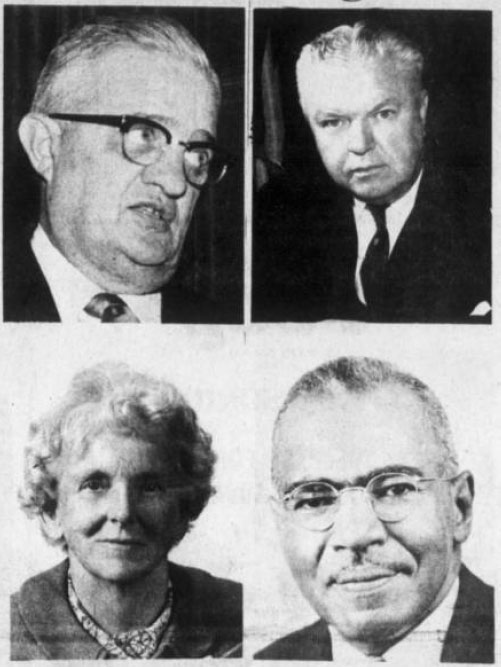
They are contending that the law passed by the State Legislature which puts the PR question on the ballot is invalid “since it applies only to Cambridge despite its general soundings”. They say it could only be adopted by a special law procedure which requires a request from the city council or the Governor.
(The law putting a PR question on the ballot was passed by the Legislature last Spring. Originally it outlawed PR, but was amended by Rep. Thomas H.D. Mahoney to include a local referendum on the question. The bill, with the amendment, was vetoed by Governor Sargent, but both the House and Senate overrode his veto.)
Callahan told the Chronicle a hearing by the full bench of the SJC would probably be held next week. He said he was hoping for a decision before the ballots are printed by the Secretary of State.
Meanwhile, the second group of former city officials formed the “Committee to Make Every Vote Count” to convince voters that plurality voting is better than PR.
This group consists of former Mayors Edward A. Crane, Joseph A. DeGuglielmo, Daniel J. Hayes Jr., Edward J. Sullivan and Advisory Committee Chairman George A. McLaughlin, Sr., all of whom are co-chairmen. Don S. Greer, president of the chamber, is treasurer.
Crane and DeGuglielmo were endorsed by the Cambridge Civic Association while on the council, and DeGuglielmo was chairman of a Committee to Save Cambridge by keeping PR when a similar question appeared on the ballot in 1965. McLaughlin was one of the co-founders of the move to adopt the city manager — Plan E charter form of government in 1938-40. Plan E at that time included PR.
In a statement announcing their effort to get plurality voting for Cambridge the committee members said:
“We now have an exhausted government in Cambridge and an exhausting tax rate, exhausted rent payers and exhausted property owners because of the 10 to 12 percent exhausted ballots which have robbed us of representation and total lack of leadership.
“In 1971 there were 30,400 ballots cast with more than 3000 exhausted ballots which could not be tallied for anyone.
“We wind up after each election with a 5-4 fractionalized city council as the result of this confusion.
“For eight long months this year the fractionalized council struggled just to settle the city manager issue.
“This set a new record for frustration and time wasted which could have been better used to provide leadership for a city so badly in need of corrective measures for the benefit of all our citizens.
“A Yes vote for plurality voting will guarantee that all the councillors and school committee members will have to answer to every voter rather than to a personal constituency.
“We want to eliminate the confusing transferable vote and substitute the American way of counting in Cambridge.
“We support a strong city manager form of government and the system will be more responsive to the will of the citizens when the electorate has nine effective votes for the city council and six effective votes for school committee.”
[Photo caption] AMONG FORMER city leaders involved in the PR issue are, top left, Former City Manager and City Councillor Joseph DeGuglielmo; top right, former Councillor Edward A. Crane; former Councillor Cornelia Wheeler, bottom left, and former School Committeeman Gus Solomons, bottom right.
PR voting: Two different views
Cambridge Chronicle, October 5, 1972
(Editor’s note: The Chronicle publishes below two separate views on Proportional Representation voting which were received in the news office this week. We do not necessarily agree with the conclusion drawn in either of the two articles.)
Let’s keep it
By BYRLE BRENY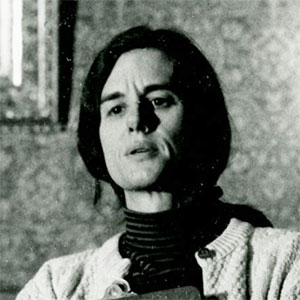
Cities all over the country are frustrated and searching for acceptable solutions to problems. They have many different kinds of charters and voting systems. The fault lies in things that are common to all cities. These are the things we must identify and correct. Changing our voting system will not bring us the money we need to get decent housing, fix our streets, build our schools, and pay for our skating rinks.
The “Committee To Make Every Vote Count” has complained about a 10 to 12 per cent exhausted vote under PR. They want plurality voting. That’s very strange because the exhausted vote in last year’s plurality election in Boston was 52 per cent. That means plurality voting is worse than PR. That can’t be their real reason.
If we end up with a 5-4 city council under plurality voting what will they blame then? All cities are divided. Cambridge is just more evenly divided than most. Voting for the plurality system won’t change that.
The four former mayors on the committee against PR know full well that any citizen of Cambridge can file a “corrective measure” with the city council.
Why would a councillor have to answer to all of the voters, or even to a majority of them, if he doesn’t need a majority to win?? Plurality voting allowed three candidates to win in Boston last time who were supported by less than a third of the voters. All of the present Boston councillors are minority councillors!
One man – one vote does not mean one man – nine votes. It means that councillors should each represent the same number of people. PR does that best. In Boston, one councillor has a 93,000 vote constituency while another has a 60,000 vote constituency. There’s nothing one man - one vote about the plurality system.
It doesn’t bother me that the first person in modern times to suggest that people use PR was a Mr. Andrae in Denmark. Who invented plurality voting? Was he an American? What’s his name? Or her name?
We will go back to the polls in November to finish the election of state representatives and state senators. If our favorite candidate lost in September we must transfer our vote to someone else. If we had been able to mark our ballots with numbers, 1 for first choice, 2 for second choice, and so on, we wouldn’t have to do it all over again. That’s all a transferable vote is, not very confusing is it?
Votes that count for losers are not very effective votes. In plurality voting in Boston last year 40 percent of the votes were for losers. In PR voting in Cambridge last year more than 90 percent of the votes were for winners. PR clearly has a much larger percentage of effective votes.
Incidentally, any city can choose a plan E type of government, including PR, by using a charter commission, unless the courts rule otherwise. None of the “alphabet charters” can be adopted by the old 10% petition and referendum method at this time. Section 96 of Plan E has not been repealed. It is the section which says “the city council shall be elected at large by proportional representation (PR)”.
(Ms. Breny was a candidate for city council in 1969.)
Let’s get rid of it
By GEORGE A. McLAUGHLIN, SR.
Many of us who worked to establish the City Manager Plan E Charter in 1938 and 1940 in Cambridge have now realized what devastation PR has brought to our Plan E government.
Even the Cambridge Chronicle, which has from the start been a strong supporter of Plan E, and still may be, said editorially in 1970 that our city is “a municipality of loose ends and unfinished business.” The editor added: “Of course the fundamental reason why things are at sixes and sevens is that our City Council lacks the kind of majority (whether CCA or coalition) that is needed to make the City Manager plan tick.” Then the editor chides the voters for a city policy which “sometimes led to confusion of voices and a delay in acting on community needs.”
The editor was wrong on one point. It is not “sixes and sevens” that divides the city but the many city councils of fours and fives.
For example, take the election of mayors to demonstrate what the customary 5-4 fractionalized council has done. It took 309 ballots and weeks to elect John D. Lynch as mayor. It took 1321 ballots and many more months to elect Michael J Neville mayor. It took 189 ballots to elect John J. Foley and 49 ballots for Alfred E. Vellucci.
And this year it took 8 long months for the city council to end its struggle on the City Manager. And all the while Cambridge community needs, citizen needs and business needs suffered from the weak system which left Councillors staring at one another.
More than one million voters in Lowell, Quincy, Worcester, Medford, Gloucester and Revere in this State and 36 other communities in the United States abolished PR and adopted the American way of counting votes. They had given the transferable voting system a fair chance to bring stability to their local governments. Today Cambridge stands alone in the entire country with the transferable voting system. Just as PR failed elsewhere, it has failed in Cambridge.
I speak for Edward A. Crane, Joseph A. DeGuglielmo, endorsed by the CCA when they were in city government, and for Daniel J. Hayes and Edward J. Sullivan who ran as independents when in city government. All four are former mayors who have reason to be concerned with the devastating results of a fractionalized city government. Don S. Greer, President of the Chamber of Commerce, and I are working with the four former mayors to put together a team of citizens which seek to take advantage of the chance given to Cambridge by the Legislature to vote YES for plurality voting on Question 10 on the Cambridge ballot on Nov. 7.
We support a strong City Manager Plan E form of government. A divided city government, fractionalized by the present PR system of voting, can only bring continued high costs, higher taxes, further confusion and instability. We want every voter to help elect all nine city councillors and all six school committee members rather than have their votes count for only one city councillor and one school committee member, if his ballots are not exhausted before the election count is completed.
A YES vote for plurality voting, when Cambridge citizens get a chance to vote, will guarantee that all city councillors and all school committee members will have to answer to every voter rather than to their personal constituency.
Next Thursday evening in the Hotel Commander at 8 o’clock the voters of Cambridge are invited to join the effort to “Make Every Vote Count.” The meeting is open to the public.
(Mr. McLaughlin is a member of the Committee to Make Every Vote Count.)
MAIL from our readers
Wants PR out
Cambridge Chronicle, October 5, 1972
Editor, Chronicle:
Having publicly advocated charter reform in Cambridge for several years, both as a candidate for city council and as a private citizen (and as recently as July 20), I was very pleased to see in last week’s Chronicle an editorial urging that it “is important ... to re-assess the present system” (Plan E).
The most immediate question we face in terms of charter reform is that of Proportional Representation, because a referendum question on PR will be on the ballot this November. PR does have its good points, but it is no doubt in part responsible for the present situation, in which our city government has virtually ceased to function as an effective servant of the people of this community.
The first step toward having a city government which does a good job is to vote against PR in November, and I strongly urge all residents who are dissatisfied with the state of affairs in this city to vote out PR. Then we can go to work to rebuild a city government which serves the needs of the people of Cambridge, a city government which is more than merely an arena for the games of windbag politicians, whether old-style or so-called new-style.
200 years ago Americans searched for, and fought for, a new way to govern themselves. That is what we need today, a new way to govern ourselves, a way which gets things done. And the place to start is by voting out PR.
STEVE NELSON
104 Kinnaird St.
PR question out; ’73 is new target
Cambridge Chronicle, October 12, 1972
The State’s Supreme Judicial Court, in an order last Friday, threw the referendum question on Proportional Representation voting (PR) off the ballot this year.
The Court issued an order to Secretary of State John F. X. Davoren not to print the question on the ballots to be used in the November 7 election here.
Plans to have the question put on the ballot next year have already gotten underway, however.
The Committee to Make Every Vote Count, composed of four former mayors, the former head of the Cambridge Advisory Committee and the president of the Cambridge Chamber of Commerce, will hold a public meeting Oct 26 at 8pm at the Hotel Commander to map a campaign to kill PR.
In other action, however, the Cambridge League of Women Voters, long a supporter of PR, reaffirmed its support at a series of memberships meetings recently.
League members agreed that in spite of their dissatisfaction with the operation of Cambridge government “PR is the voting system that gives the most accurate representation to minority groups at the same time it ensures majority rule,” according to Nancy R. Evans, city government chairman of the League.
The Supreme Court case to get the PR question off the ballot was brought by former City Councillors Don Belin and Connie Wheeler, former School Committeeman Gus Solomons, Professor Edwin C. Newman, husband of State Secretary of Manpower Affairs Mary Newman and attorney Gerald Berlin.
They contended that the State law putting the question on the ballot was “invalid” because it applied only to Cambridge “despite its general soundings”.
That law was passed by the Legislature last spring. Originally it simply outlawed PR, but was amended by Rep. Thomas H.D. Mahoney to include a local referendum. Mahoney said at the time his concern was not with the merits of PR but with reserving the right to decide its fate with Cambridge voters.
Governor Sargent vetoed the bill, with the amendment, but the Senate and House overrode his veto.
The Committee to Make Every Vote Count was formed in early September to mobilize support to dump PR in favor of plurality voting if the question remained on the ballot.
Committee members include former Mayors Daniel Hayes, Edward A. Crane, Joseph DeGuglielmo and Edward J. Sullivan, former Advisory Committee Chairman George A. McLaughlin and Chamber President Don S. Greer.
Speaking for the Committee, Hayes said the members were “disappointed that voters will not have an opportunity to vote on PR this year”.
Hayes expressed surprise that the group which has “stressed power to the people” in the past took action to deprive voters of the right to decide the PR question on the November ballot.
“At a time when an estimated 40,000 will go to the polls in Cambridge, the PR supporters decided to go to court to deprive them of the right to vote on the question.”
The former North Cambridge city councillor said the current voting system has fractionalized the nine member Council and six member School Committee into a group “who represent neighborhoods rather than the entire city.”
Hayes said that fractionalization was the cause of the delay in electing a city manager and a new school superintendent.
Mail from our readers
League supports PR
Cambridge Chronicle, October 12, 1972
Editor, Chronicle:
At a series of recent membership meetings the Cambridge League of Women Voters reaffirmed its support of proportional representation in Cambridge. League members agreed that in spite of their dissatisfaction with the operation of Cambridge government, PR is the voting system that gives the most accurate representation to minority groups at the same time that it insures majority rule. PR guarantees minority groups - racial, ethnic, or ideological - representation but not control over the governing body. PR prevents a minority of the voters from winning a majority of seats on the council.
On the other hand, at-large plurality voting makes it possible for a bare majority to sweep all of the seats on the council or even for a minority of the voters to capture a majority of the seats. Although plurality voting might give us a council that could easily reach agreement, such agreement could be bought at the price of many groups and points of view being excluded from the debate.
The experience of cities such as Cincinnati and Worcester which have switched from PR to at-large plurality voting shows that under plurality voting it becomes increasingly difficult for new candidates to win, for incumbents to be unseated, and for minority groups to be represented.
We believe that PR is not the cause of our problems in Cambridge; it simply reflects quite accurately the different forces and points of view that actually exist in the city. Most cities - with diverse populations and interest groups - whatever their form of government or voting system — are similarly dissatisfied with the operation of their government since all segments of the population are not being served equally; taxes are rising at all levels of government and taxpayer dissatisfaction is growing.
We therefore object to any view which attempts to simplify the debate over city government by pinning the blame on PR and which purports to solve our problems simply by getting rid of our present voting system. Instead we urge Cambridge citizens to look at our total structure of government - PR, council-manager form, the state-mandated authorities and procedures, as well as the personalities and forces at work in our community — before attempting to diagnose our problems and prescribe a solution to them.
NANCY R. EVANS
City Government Chairman
League of Women Voters of Cambridge
Citation: 362 Mass. 530
Parties: G. D'ANDELOT BELIN & others vs. SECRETARY OF THE COMMONWEALTH.
County: Suffolk
Hearing Date: October 4, 1972
Decision Date: October 19, 1972
Judges: TAURO, C.J., REARDON, QUIRICO, BRAUCHER, & KAPLAN, JJ.
Statute 1972, c. 596, requiring that a question regarding a change to plurality voting be placed on the ballot to be used at the biennial state election in any city or town with proportional representation voting but in fact, when enacted, applicable only to the city of Cambridge, is a special act “relating to cities and towns” and not a general law applicable “to a class of not fewer than two” cities and towns, and thus violates art. 89 of the Amendments to the Massachusetts Constitution in that it was enacted neither on a petition filed or approved by the voters or the city council nor by the two-thirds vote of each branch of the General Court following a recommendation of the Governor.
PETITION for a writ of mandamus filed in the Supreme Judicial Court for the county of Suffolk on September 21, 1972.
The case was reserved and reported by Reardon, J.
Acheson H. Callaghan, Jr. (Barry R. Furrow & Jeffery Swope with him) for the petitioners.
Walter H. Mayo, III, Assistant Attorney General, for the Secretary of the Commonwealth.
George A. McLaughlin & Edward J. Lonergan, amici curiae, submitted a brief.
Charles H. McGlue was present but did not argue.
REARDON, J. The petitioners, residents, taxpayers, and duly registered voters in Cambridge, have petitioned for a writ of mandamus. The facts are not in dispute.
Cambridge has a Plan E form of government conformable to G. L. c. 43, Sections 93-116, as amended, and is the only city or town in the Commonwealth where officers are elected by proportional representation or preferential voting. The respondent was in the process of preparing a question contained in St. 1972, c. 596, Section 3, to be placed on the official ballot for the November 7, 1972, biennial State election in Cambridge. The question described in Section 3 will not appear on the ballot in any other city or town in the Commonwealth. Statute 1972, c. 596, which was enacted over the veto of the Governor, provides as follows:
“SECTION 1. Section one hundred and fifteen of chapter forty-three of the General Laws is hereby repealed.”
“SECTION 2. Chapter fifty-four A of the General Laws is hereby repealed.”
“SECTION 3. The state secretary shall cause the following question to be placed on the official ballot to be used at the biennial state election in each city in which voting by proportional representation or preferential voting is in effect: --
‘Shall the elective officers of this city be nominated by preliminary election and elected by ordinary plurality voting?’ YES. NO.”
“The state secretary shall cause the following question to be placed on said ballot in each town in which voting by proportional representation or preferential voting is in effect: -- ‘Shall the elective officers of this town be elected by ordinary plurality voting?’ YES. NO.”
“If a majority of the votes in answer to such question by any such city or town is in the affirmative elective officers in such city or town shall thereafter be nominated and elected in the manner provided in said question.”
“If a majority of the votes in answer to said question is in the negative those elective officers who, on the date of said election, were elected by proportional representation or preferential voting shall continue to be so elected.”
Statute 1972, c. 596, was not enacted (1) on a petition filed or approved by the voters or by the city council of Cambridge, or (2) by a two-thirds vote of each branch of the General Court following a recommendation by the Governor.
The contention of the petitioners is that because St. 1972, c. 596, was enacted in violation of art. 89 of the Amendments to the Constitution of the Commonwealth (the home rule amendment), it has no force and effect, and the respondent is under a duty not to place the question described in Section 3 therein on the official ballot in Cambridge for the biennial State election to be held on November 7, 1972.
Section 1 of art. 89 provides, “It is the intention of this article to reaffirm the customary and traditional liberties of the people with respect to the conduct of their local government, and to grant and confirm to the people of every city and town the right of self-government in local matters, subject to the provisions of this article and to such standards and requirements as the general court may establish by law in accordance with the provisions of this article” (emphasis supplied).
The provisions limiting the power of the Legislature are to be found in Section 8 of the article. On its face it is plain that St. 1972, c. 596, can be classified as a law “in relation to cities and towns” and therefore subject to the restrictions of Section 8. If it be a special law, it is unconstitutional since it was not enacted on a petition filed or approved by the voters or by the city council of Cambridge or by a two-thirds vote of each branch of the General Court following a recommendation of the Governor.
If on the other hand c. 596 can be viewed as a general law applicable “to a class of not fewer than two” cities and towns, there being no obstacle in art. 89 to the enactment of such laws, it is constitutional.
The basic issue thus is whether St. 1972, c. 596, by its terms applicable to a class of “all” cities having proportional representation but in fact only to Cambridge, is to be characterized as a general law applicable to a class of not fewer than two or as a special law within the meaning of Section 8 of art. 89.
In Opinion of the Justices, 356 Mass. 775, we stated that legislation for a multi-purpose stadium, tunnel and an arena was, in most of its aspects, regional legislation having some State-wide effect and was not to be considered as a law “in relation to cities and towns,” and therefore was not subject to the requirements for either general or special laws specified in Section 8. We there noted, “We do not interpret the words ‘to act in relation to cities and towns’ as precluding the Legislature from acting on matters of State, regional, or general concern, even though such action may have special effect upon one or more individual cities or towns. If the predominant purposes of a bill are to achieve State, regional, or general objectives, we think that, as heretofore, the Legislature possesses legislative power, unaffected by the restrictions in art. 89, Section 8. On the other hand, in instances where the primary purpose of a major and severable portion of a bill, otherwise enacted for State, regional, or general purposes, is to legislate ‘with respect to . . . [the] local government,’ or ‘local matters,’ of a particular city or town, it may be necessary to consider whether in the particular circumstances that severable major portion complies with Section 8 of art. 89. pp. 787-788.
In our view the last quoted sentence is fully applicable to c. 596, Section 3. That section provides for a question to be placed on a municipal ballot which, if approved by the voters in Cambridge, will alter the method by which the city council and the school committee are elected in that city. It is directly and solely concerned with altering a crucial feature of municipal government. If the words “in relation to cities and towns” are to be given any meaning they must be applicable to this statute. Therefore, c. 596, Section 3, must be subject to the requirements of art. 89, Section 8.
We thus consider whether c. 596, Section 3, applies alike “to all cities, or to all towns, or to all cities and towns, or to a class of not fewer than two.” That c. 596, Section 3, is phrased in general terms, and is, arguably, potentially applicable to cities in addition to Cambridge at some indefinite future time, is not sufficient to meet the test which Section 8 of art. 89 establishes. When enacted, c. 596, Section 3, was applicable in fact only to Cambridge. That it was phrased in general or specific terms does not control under Section 8, which prescribes a clear and simple test of minimum applicability. In Opinion of the Justices, 357 Mass. 831, we pointed out relative to an act affecting the towns of Southwick and West Springfield that it met the test of a general law within the meaning of the first sentence of art. 89, Section 8, and, hence, did not need to be enacted in accordance with the special procedures for special laws there defined. That case involved two towns, a situation quite different from that which confronts us here.
We said in Mayor of Gloucester v. City Clerk of Gloucester, 327 Mass. 460, 464, “No municipality has any vested right in its form of local government. All such matters are subject to the paramount authority of the Legislature, which may change, and even abolish, at will.” However, the relevance of this and other cases decided prior to 1966 has been considerably diminished, if not erased. The adoption of art. 89 “effected substantial changes in the legislative powers of the General Court and the cities and towns.” Opinion of the Justices, 356 Mass. 775, 787.
In sum, art. 89 was adopted by the people to prevent precisely the type of legislation which is represented by St. 1972, c. 596, Section 3.
It is for this reason that, by our order dated October 6, 1972, we have directed the issuance of a peremptory writ of mandamus commanding the respondent not to print the question contained in St. 1972, c. 596, Section 3, on the official ballot for the biennial State election of Cambridge.
Note on Gaspard D'Andelot Belin
Guy D. Belin (May 30, 1918 – April 15, 2003; also referred to as Don Belin) was elected to the Cambridge City Council in 1961. He resigned effective November 13, 1962 to take a position in Kennedy Administration as General Counsel to the United States Treasury. (He was McGeorge Bundy's brother-in-law.) Cornelia (Connie) Wheeler was easily elected on his redistributed vote on November 16, 1972 in the Vacancy Recount.
He and his wife Harriett Bundy Belin are buried in Mount Auburn Cemetery.
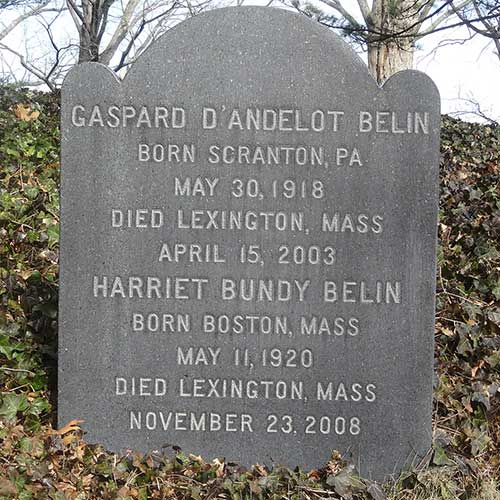
Sept 28, 2022 – As part of an historical research project on Cambridge civic/political history and the chronology of the city’s charters that John Pitkin and I have been doing, today I updated my turnout charts to coincide with the entire Plan E era. We’ll soon take this back in some form or another to around 1846. - RW
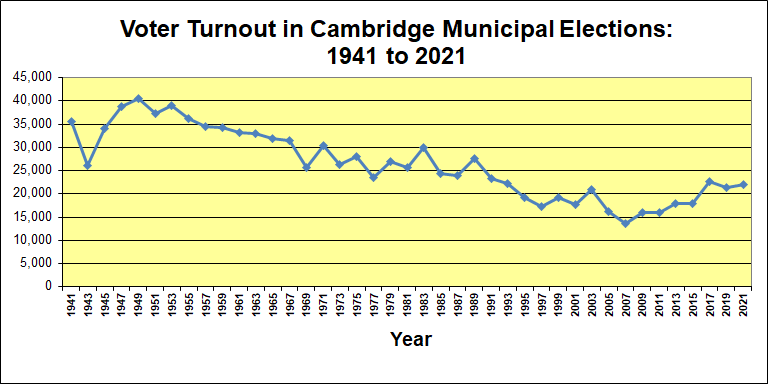
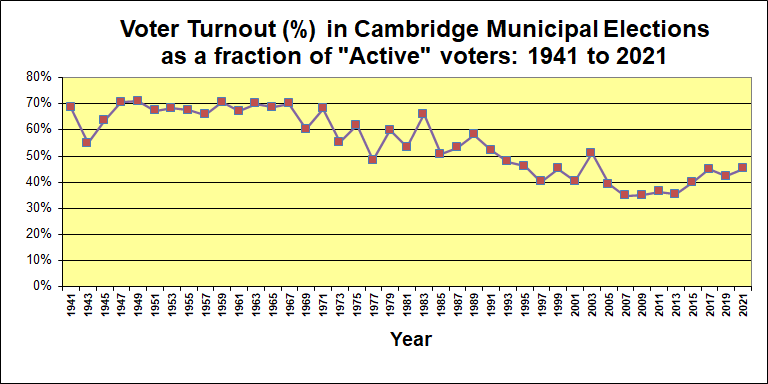
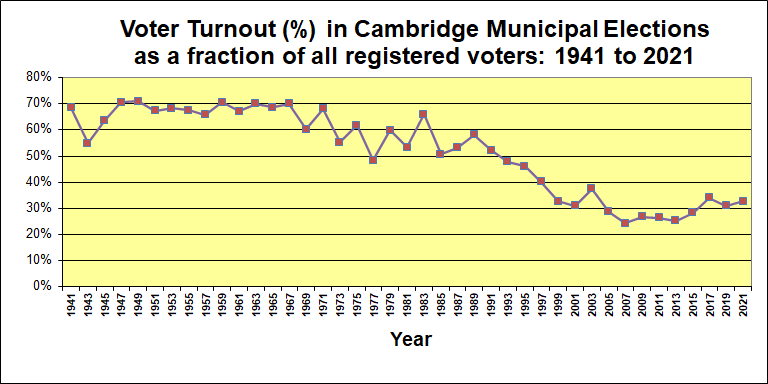
Jan 26, 2023 – In this year when charter review is underway and possible charter revision may be on the horizon, it is perhaps valuable to look back at some provisions of previous Cambridge City Charters for some guidance. For example, in the original 1846 Cambridge City Charter, there’s this: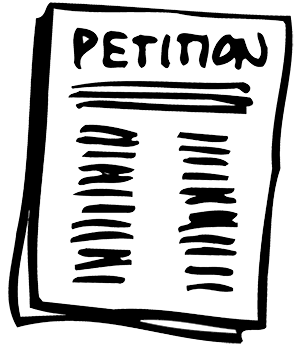
Sect. 19. General meetings of the citizens qualified to vote may, from time to time, be held, to consult upon the public good, to instruct their representatives, and to take all lawful measures to obtain redress of any grievances, according to the right secured to the people by the Constitution of this Commonwealth; and such meetings may, and shall be duly warned by the mayor and aldermen, upon the requisition of thirty qualified voters.
Perhaps “the requisition of thirty qualified voters” may not be the appropriate standard today in a city of 120,000 people, and perhaps the procedure should be modified to be more aligned with the way our City Council and School Committee is constituted under the current charter, but there should be a reasonably attainable standard that would allow for “redress of grievances.” The current situation is that a group of hundreds of citizens could send a petition to the City Council (or, presumably the School Committee) asking for reconsideration or change in some policy or ordinance, or action of the City or School administration, but that petition would likely only appear as a “Communication” on an agenda that could, and generally is, simply “Placed on File.” A better system would be to have the respective elected body or City department be required to respond and vote on any reasonable question or request in a timely manner, e.g. within thirty days.
It is a deficiency in the current Plan E Charter that other than begging a city councillor to file a policy order (which could well end up under “Awaiting Report” for months or years), there is no effective way for citizens to hold their elected officials or the City Administration (or any specific department) or the School Department accountable. Requiring a positive or negative response - on the record - would go a long way toward addressing the problem expressed by so many Cambridge residents that they “are not being heard.” - Robert Winters
In the Spring of 2014, when an art walk was being planned for River Fest, organizers invited Peter to talk about his Cosmic Moose and Grizzly Bear’s Ville fence, the imaginative “canvas” he’d created in front of his home on the corner of Brookline and Franklin streets.
From locals around Cambridgeport, to tourists wandering off the beaten path in Central Square, the fence was legendary. People would stop to read the insights, wit and philosophy that Peter freely shared. If he was home, some were lucky enough to chat with him. Regular visitors noticed that, from time to time, he would add new thoughts for passersby to stop and ponder.
Peter declined the invitation to speak about the fence at the June festival but asked me – his brother-in-law, (we called each other “brothers-in-love”) – to speak in his place. I quickly told Peter that I didn’t feel qualified to speak about the fence, but I had an idea: what if I read a sampling of his writings “so the fence could speak for itself.”
Peter agreed. When we met before I began compiling his insights, Peter told me, “At a certain point when I was creating the fence, I thought it was a living thing. And then I came to feel it was the Earth speaking. And then – I just let go.”
What follows is a selection that I read at River Fest that year and again at Starlight Square on September 10, during the uplifting, heartfelt celebration of Peter’s remarkable life.
— Rob Okun
 Thought is beautiful.
Thought is beautiful.
Talk to the day.
There is only one frontier that’s endlessly self-fulfilling – the frontier of words.
You are having an intergalactic conversation with the fence.
Freedom is a special tree. It can only be grown by a fierce gardener.
Truth cannot be voted on. Either you allow it in or you are without it.
Your only true power is your uniqueness, which you will never discover if you crave group similarities.
Problems aren’t the problem. Solving them magnificently is the problem.
It’s okay to be happy. It’s better to be ready.
All lies are honest.
It’s permissible to lie to a liar because for a liar being lied to is like being made love to.
Only the pure makes you honest.
I’m stumbling my way into perfect expectations. Be careful not to trip on me.
Stop talking. Make something incredible.
Today’s date is – forever.
© Peter Valentine, 2022
 Feb 14, 2023 - Valentine’s Day this year marks the 45th anniversary of my moving to Cambridge (and I've lived in the same building the entire time). Moving Day in 1978 for me was the first day the roads were fully open for the Greyhound Bus to make the trip from New York City to Boston after the Blizzard of 1978. That year I covered the rent by tutoring area college students in mathematics, physics, and chemistry based in little notices I stapled onto various message boards at MIT, Harvard, Northeastern, and Boston University. I had already applied to graduate school at MIT, but I would not learn that I had been accepted (with a Teaching Fellowship) until (appropriately) April Fools Day. When I got the phone call informing me that I had been accepted, I literally jumped for joy. Unfortunately, I was standing in a doorway at the time and managed to slam my head into the top of the doorway yielding a rather dramatic bleeding head wound minutes before the doorbell rang with a student coming over for tutoring. She was a nursing student, took a look at the blood streaming down my face, and said simply, “You ought to do something about that.”
Feb 14, 2023 - Valentine’s Day this year marks the 45th anniversary of my moving to Cambridge (and I've lived in the same building the entire time). Moving Day in 1978 for me was the first day the roads were fully open for the Greyhound Bus to make the trip from New York City to Boston after the Blizzard of 1978. That year I covered the rent by tutoring area college students in mathematics, physics, and chemistry based in little notices I stapled onto various message boards at MIT, Harvard, Northeastern, and Boston University. I had already applied to graduate school at MIT, but I would not learn that I had been accepted (with a Teaching Fellowship) until (appropriately) April Fools Day. When I got the phone call informing me that I had been accepted, I literally jumped for joy. Unfortunately, I was standing in a doorway at the time and managed to slam my head into the top of the doorway yielding a rather dramatic bleeding head wound minutes before the doorbell rang with a student coming over for tutoring. She was a nursing student, took a look at the blood streaming down my face, and said simply, “You ought to do something about that.”
45 years laters (and more than 35 years after buying my building), I’m still here, still teaching, and most likely couldn’t now jump high enough to hit the top of the doorway. - Robert Winters
There were 15 new COVID positive tests reported today (covering 3 days), and the 7-day daily average decreased from 5.4 to 5.1 cases/day. The total number of residents who have tested positive is now 35,353 (not including me and possibly thousands of others who have tested positive at home). The Cambridge total increased by 15 today (covering 3 days), and 2, 10, 11, 6, 20 (covering 3 days), 6, 5, 15, and 23 (covering 4 days) in recent days. Time will tell where this is headed as the BA.4&5, the BF.7, the BQ.1, and the even newer XBB variant continue to work their way through. The 7-day averages are now in the 5-10 range. The percentage of positive tests (measured over the last two weeks) stands at 5.23% (recent previous rates 6.96%, 6.73%, 7.84%, 9.06%, 11.22%, 11.99%, 8.82%, 8.29%, and 8.5%). Most importantly, the effects of the latest virus variants (along with vaccinations) appear to be much milder.
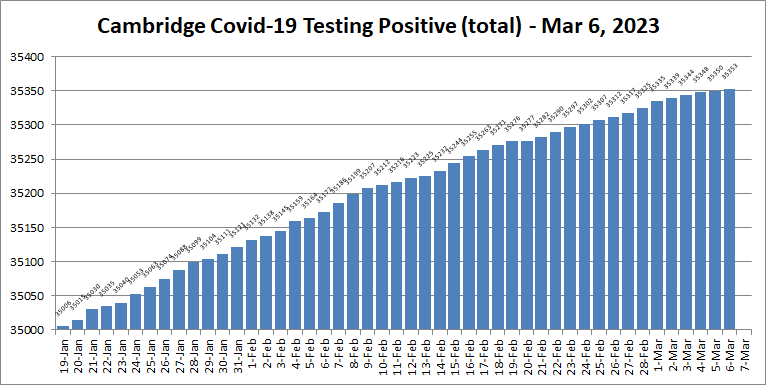
Click on graph above for latest Cambridge data.
Mar 6, 2023 Breakdown of Cases:
35353 tested positive (total) - an increase of 15 since Friday
[includes 4502 Harvard (0 new) and 2839 MIT (0 new)]
187 confirmed deaths - 93 in long-term care facilities, 94 in general community
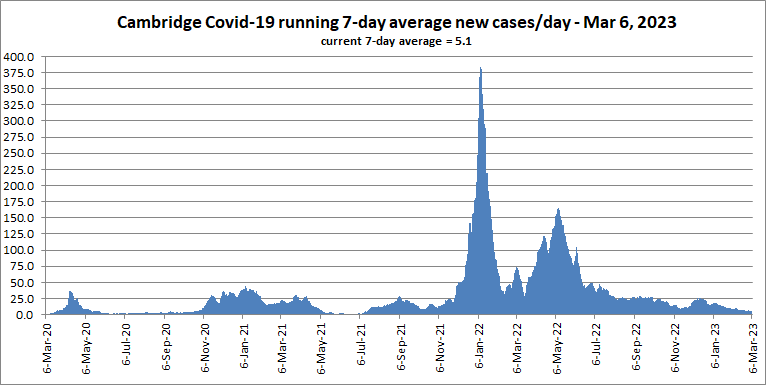
Thanks to vaccinations, even though the 7-day averages were dreadful
the impacts were not as bad as they could have been.
City of Cambridge Covid Information Harvard University COVID-19 data MIT COVID-19 data
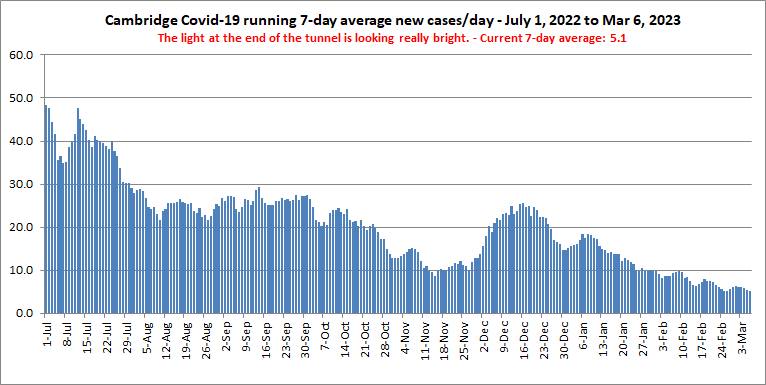
High vaccination rates have helped to blunt what might have been a larger surge and far more deaths.
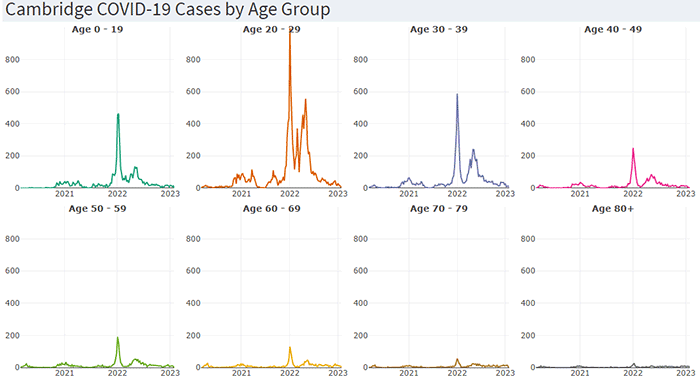
Covid Cases by Age Group - through Feb 10, 2023
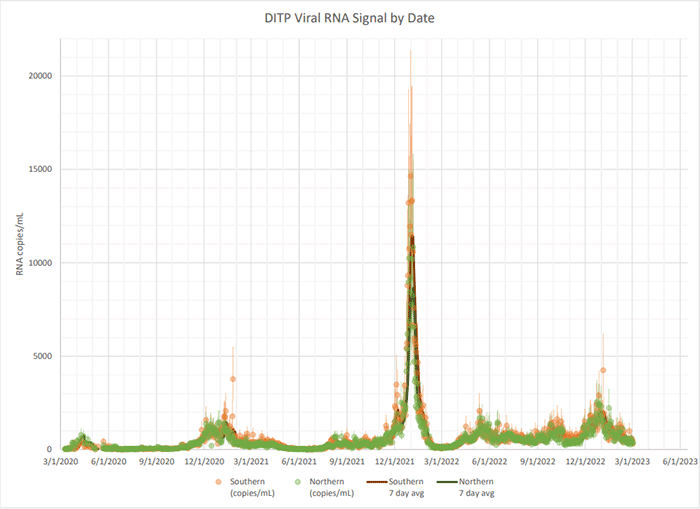
(click on above graph for the latest)
MWRA Biobot wastewater data - Mar 2, 2023
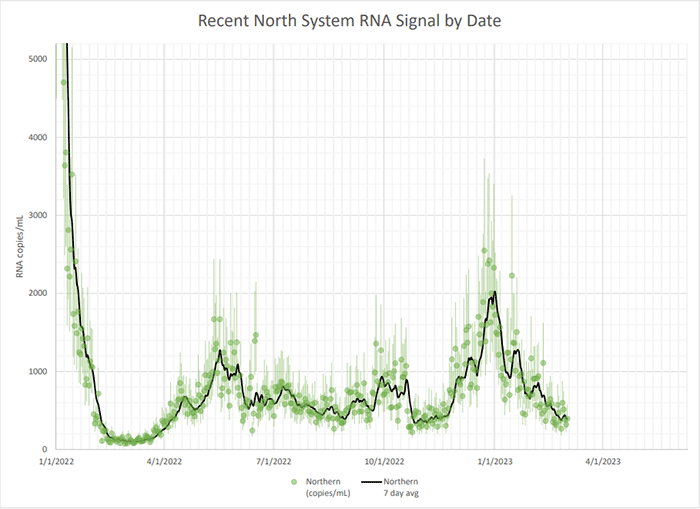
MWRA Biobot recent wastewater data - North System - Mar 2, 2023
The 7-day average reached as high as 8644 (copies/mL) in January 2022 before dropping to as low as 101 in March.
The BA.2 variants brought it back up to 1273 in May before dropping to under 400.
Recently it rose as high as 2023 due to the latest variants, but now stands at 394 (copies/mL).
| Sample Date | 2/9 | 2/10 | 2/11 | 2/12 | 2/13 | 2/14 | 2/15 | 2/16 | 2/17 | 2/18 | 2/19 | 2/20 | 2/21 | 2/22 | 2/23 | 2/24 | 2/25 | 2/26 | 2/27 | 2/28 | 3/1 | 3/2 |
| North System (copies/ml) | 461 | 1110 | 498 | 366 | 579 | 547 | 588 | 647 | 592 | 353 | 391 | 334 | 312 | 573 | 472 | 371 | 266 | 599 | 513 | 384 | 321 | 394 |
| Northern 7-day Avg. | 674 | 694 | 681 | 598 | 558 | 559 | 561 | 588 | 538 | 512 | 517 | 478 | 441 | 439 | 420 | 393 | 377 | 401 | 426 | 439 | 404 | 394 |
The percentages detected in wastewater samples in Middlesex County are now XBB* at 100.0%, BA.5* at 0.0%,
BQ.1* at 0.0% as of the week of Feb 13. [updated Mar 2]
Omicron Variant Overview - as of Feb 27, 2023 [updated Mar 2]
| Region | BA.2* | BA.4* | BA.5 | BF.7 | BQ.1* | XBB* | Other |
| Nationwide | 7.5% | - | 6.5% | - | 0.4% | 85.4% | 0.3% |
| Midwest | 7.0% | - | 7.6% | - | 9.5% | 66.3% | 0.2% |
| Northeast | 1.1% | 0.9% | 2.9% | 0.3% | 4.5% | 90.0% | 0.3% |
| South | 6.3% | 0.7% | 5.5% | - | 5.2% | 81.6% | 0.7% |
| West | 5.0% | 0.1% | 6.5% | - | 6.5% | 81.7% | 0.2% |
An asterisk (*) indicates that sub-lineages are included. “Other” indicates all other lineages of SARS-CoV-2, including Delta.
Perhaps it’s a good time to burn some bridges and take sides. The 2023 Municipal Election Season has now begun and there is some detritus that needs to be disposed.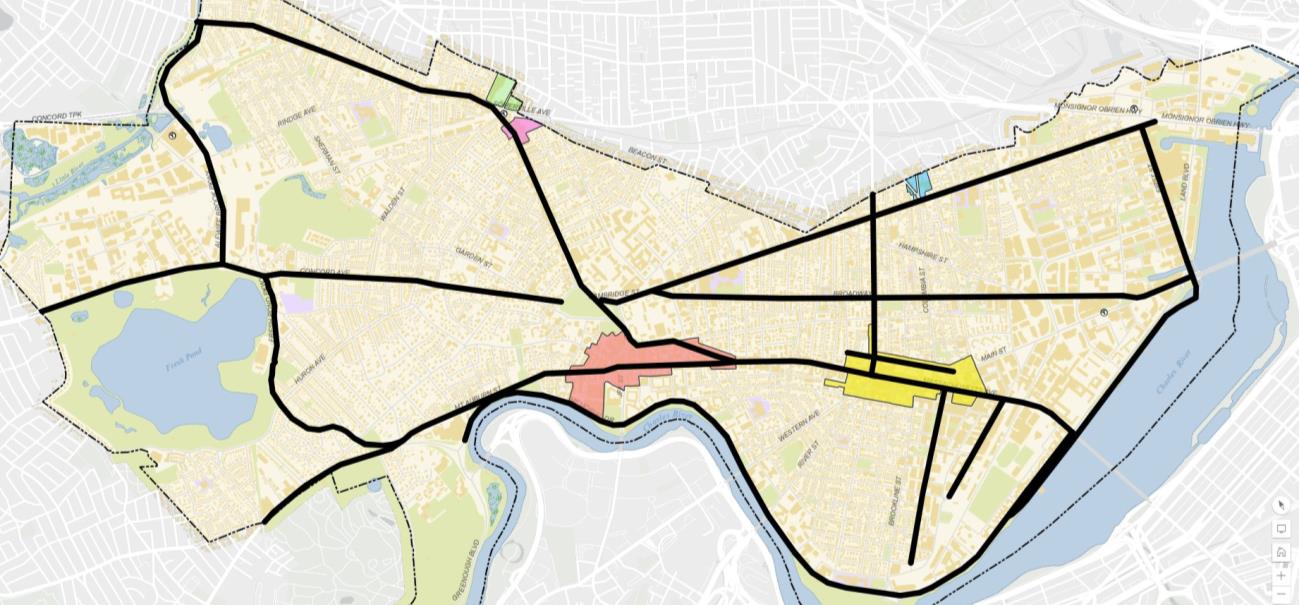
Order #15. Amendments to the Affordable Housing Overlay. Councillor Azeem, Councillor McGovern, Councillor Simmons, Councillor Zondervan
pulled by Toner; Azeem amendment Fails (BA,MM,DS,QZ - YES; DC,AM,PN,PT,SS - NO)
QZ amendment to Require Committee Reports by Jan 31, 2022 Fails 4-5 (BA,MM,DS,QZ - YES; DC,AM,PN,PT,SS - NO)
Toner Amendment to send to Housing Committee and NLTP Committee (rather than to Ordinance Committee & Planning Board) Adopted 8-1 (QZ - NO)
Order Adopted as Amended 8-1 (QZ - NO)
This may well be the most outrageous proposal I have ever seen from this or any other Cambridge City Council. Please read the full text of this Order and the accompanying maps. It simply blows past decades of thoughtful, deliberative planning and public participation in favor of dramatic upzoning without any meaningful opportunity for public response or input. I will add that we may now be at the point where proposals such as this will have to be viewed through a “regulatory taking” lens in the sense that what is allowed and what is proposed to be allowed for government-sponsored developers is dramatically more than what is allowed for ordinary property owners. It seems as though the policy of this City Council has become completely skewed toward moving privately-owned property toward “social housing” – and they apparently are willing to keep skewing the rules to benefit their chosen developers (who are likely also the ones drafting the regulations) until they achieve this shift.
I feel some obligation to now talk about proportional representation elections. In the absence of any true civic and political infrastructure in Cambridge, our municipal elections have become dominated by single-issue advocacy groups. In the absence of a true local newspaper willing to listen to community concerns and provide objective journalism, political propaganda has become the rule, and that includes partisans embedded in neighborhood listservs eager to attack anyone who might stand in the way of their respective agendas. So here is my first bit of advice when it comes time to vote in the next municipal election – in addition to considering which candidates you find acceptable and ranking them by preference, think even more about which candidates you should exclude from your ballot. We are now in a period where voting for candidate slates is being strongly encouraged, and in an environment where most residents remain unaware of the actions and proposals of councillors and candidates, propaganda can dominate. The truth is that some candidates win regardless of endorsements and it’s demonstrably false to claim that a majority of voters support policies of your organization simply because they are included on your candidate slate. We have never actually polled Cambridge voters about specific issues, and the range of criteria used by most voters in their candidate preferences is as wide as an ocean.
The ABC group (more properly called “A Bigger Cambridge”) has never made a secret of its long-term mission - namely to dramatically increase heights and densities everywhere in Cambridge, to eliminate all neighborhood conservation districts and historic preservation regulations, and to “streamline” permitting in the sense that most or all rights to object to development proposals should be eliminated. One of their principal officers even suggested a target population of at least 300,000 for Cambridge a few years ago (that’s about triple the current population). This is like the reincarnation of Robert Moses as Jane Jacobs rolls over in her grave. I actually ranked 3 of the 9 candidates ABC endorsed in the 2021 municipal election. I will not rank any of their endorsees again even if I like them personally, and I encourage others to do the same. This, by the way, should not be viewed in any way as an endorsement of any other candidates or candidate slates - despite what some activists may choose to think (or tweet).
Here’s a letter sent by Patrick Barrett to the City Council that captures many of my sentiments and makes some very important points:
Honorable Mayor Siddiqui and Cambridge City Council,
I have to admit that following this Council lately is a lot like drinking from a fire hose. It has been difficult to keep up with all of the proposed changes. This latest amendment request has a lot of stuff in it but instead of getting tangled in the binary weeds of yes or no I think what I am seeing here is a moment in time where we ought to clearly state or get comfortable with where this city is headed. In about a month it will be C2’s 9th birthday ... a failed planning initiative that was ultimately rejected by CDD, some current councillors, and the Planning Board. I compare that five year process to this petition and I can only think about how massively this conversation about development has changed in such a short time. Back in those days (2013) 14 stories was declared too tall, would block out the sun, and force MBTA personnel to use brooms to push passengers into overcrowded T stops. Dark times to be sure. However, now the pendulum has swung wildly in another direction where proponents of any change now state that an “emergency” dictates that we must act immediately on everything … all the time … no matter what. Even worse, proponents of everything from BEUDO to the AHO state that to not be 100% onboard is akin to doing nothing, being a climate denier, being anti-housing, or being a racist. It is hard to take them seriously especially in a city like Cambridge where it is unlikely and rare to find another city that does more within 6.2 sq miles on either subject. Maybe we ought to start thinking about what we do instead of berating ourselves over the false perception that we do nothing?
I am supportive of “tall” buildings in Central Square in part because we already have them and because Central Square, more than most areas of the City, has yet to come close to realizing its potential. However I think this has to do more with a lack of vision than archaic zoning, though to be clear Central Square zoning is the absolute worst in the city. I must admit, and please do not faint, that I have an issue with 100% affordable development schemes; especially when they preclude market rate developments that match. For instance, Central Square has a base height of 55' whereas this proposal would allow for 280' and potentially unlimited height depending on how you interpret the section on open space subparagraph (f). I’m not sure I care that much about height and I cannot tell the difference between an 18 story building or a 24 story building especially from the ground floor but such a wildly disproportionate development scheme for one type of housing is a mistake anywhere and especially in an area that already exceeds 30% affordable for total housing stock. I say this in light of the fact that proponents of the AHO often cited lack of affordable housing in other parts of the city, currently below even 40b standards, and that the AHO was designed to fix that. This has not been the case so far and maybe it makes sense to put the lion share of affordable housing in one section of the city … but I've yet to hear anyone in planning or the City explain why. I also believe that market rate housing IS the “affordable housing” for the vast majority of people coming to Cambridge who do not qualify for affordable housing. Without a substantive plan to address that population aren’t we just kicking the can and further exacerbating values? Have we decided collectively that supply and demand is a myth? If so that might help explain this strategy though I've not heard that openly expressed by CDD or City Staff.
My questions about this policy change are more about bigger picture issues:
1) Are we no longer going to permit market rate development?
2) Do we have a goal with regard to affordable housing?
3) Have we thought about what happens once people are housed or are we merely counting units?
4) What happens in the commercial districts or more importantly a cultural district when the developer is no longer bound to zoning in any way?
5) Is home ownership no longer a goal?
6) If the council feels that 280' is an appropriate height for buildings, why limit that to affordable only?
7) Has anyone audited the impact of the AHO on market costs?
8) Have we assessed the impact of changing inclusionary zoning since it was increased in 2015?
9) Is there a conflict of interest with the affordable housing trust where the Manager, affordable developers, and a few interested parties are solely responsible for doling out taxpayer money to each other for their own projects and also now draft zoning changes with City staff to remove their need to comply while everyone else has to? I cannot imagine we’d accept this arrangement for market rate development. Why is it OK here?
10) I would love to hear someone articulate a clear vision for the City. In Central Square we have been pushing our own vision in the absence of a clear direction from the City. I am happy to share that vision; would you kindly share yours?
Lastly, our ordinance is a book about us and our values and it seems at this moment in time it is making assumptions that are incorrect. Maybe this is the moment where we take a pause and try to piece together the dozens of studies, reams of data collected over four decades, and actually reform our zoning code to reflect the values everyone seems to claim they have? It doesn’t have to take another decade or even more than a few months, but if we are planning for the next 150 years like our university friends do we should be looking at this top down not through the narrow lens of one subject.
CC: Hatfields
CC: McCoys
Regards and Happy Thanksgiving,
Patrick W. Barrett III
Order #18. That the memo from Charles Sullivan regarding Comments on Citizen’s Petition to Amend Ch. 2.78, Article III, Neighborhood Conservation Districts and Landmarks and the memo from Charles Sullivan regarding the Proposed Friendly Amendments to Ch. 2.78, Art. III be forwarded to the full City Council with the recommendation to refer said memos to the Ordinance Committee for further discussion. Councillor Carlone
Order Adopted 9-0
Committee Report #2. The Neighborhood and Long-Term Planning Committee conducted a public meeting on Oct 25, 2022 to discuss the Neighborhood Conservation District Citizen’s Petition: Historical Commission Proposed Response. [text of report]
Report Accepted, Placed on File 9-0
Suffice to say that the “Neighborhood Conservation District Citizen’s Petition” is one of ABC’s policy goals to minimize or eliminate public review of development proposals. As for Neighborhood Conservation Districts in general, while I absolutely would not want them to dictate what paint I can use on my house or the requirement of materials that are dramatically more expensive, I absolutely support their underlying purpose. In spite of the Robert Moses view of things, I believe there are many things in Cambridge worthy of preservation.

Apply to Cambridge Works (Mar 6, 2023)
Cambridge Redevelopment Authority Vacancy (Mar 6, 2023)
Cambridge Community Benefits Advisory Committee Vacancy (Mar 6, 2023)
Orientation Workshop for Foreign-Trained Immigrants (Mar 6, 2023)
LGBTQ+ Fair Housing Event (Mar 6, 2023)
Notice of Pole and Conduit proposed Small Cell Policy changes (Mar 6, 2023)
Fuel Assistance Deadline Extended to May 12 (Mar 6, 2023)
Cambridge Police Superintendent Receives Public Service Award and Completes Doctorate from NYU (Mar 3, 2023)
Sign Up for the Small Business Coaching Program (Mar 2, 2023)
The Capital Network Workshop Series (Mar 2, 2023)
Bent Street to Return to Two-Way Traffic Week of March 6 (Mar 1, 2023)
Cambridge Launches Separated Bike Lane Project on Main Street (Feb 28, 2023)
Current City Board and Commission Vacancies: Planning Board (Feb 27, 2023)
National Consumer Protection Week March 5-11 (Feb 27, 2023)
Cambridge Police Safely Resolve Barricade Situation (Feb 25, 2023)
City of Cambridge Emergency Medical Response (Feb 24, 2023)
Cambridge Teens: Apply to CYP’s Paid Spring Internships! (Feb 24, 2023)
Fire companies responded to an extraordinary number of emergency calls for service (Feb 23, 2023)
Renew Your Cambridge Parking Permit Online by March 3 (Feb 23, 2023)
Sayed Faisal Update from Mayor Siddiqui (Feb 23, 2023)
Ms. Siddiqui blames the City Charter for standing in the way of the Party for Socialism and Liberation: “In Cambridge, our charter grants the City Manager power over the Police Department as well as oversight of personnel matters. There have been repeated demands from the community to release the name of the officer who shot Faisal, and I personally believe this is an important step for the sake of transparency, but a statement released last week made clear the City will not do so.”
Government & Public Sector Job Fair - Wed, March 8 (Feb 21, 2023)
Small Business Social Media Strategy Workshop Series (Feb 16, 2023)
Cambridge Adopts the Massachusetts Specialized Stretch Energy Code (Feb 16, 2023)
2023 Annual City Census (Feb 15, 2023)
Community Update from Cambridge Police on January 4th Fatal Shooting (Feb 14, 2023)
Community Update from City Manager Huang (Feb 14, 2023)
Sidewalk Poetry Contest: Get Your Words Imprinted In Concrete! Apply By March 10 (Feb 13, 2023)
Nominate a Business to the City of Cambridge's Legacy Business Program (Feb 13, 2023)
Cambridge Police Adds First All-Electric Vehicles (Feb 10, 2023)
City of Cambridge Closures and Service Information for Presidents Day Holiday on Monday, February 20 (Feb 10, 2023)
DHSP Announces Summer Camps and Programs (Feb 10, 2023)
Cambridge Submits Interim Action Plan for MBTA Communities (Feb 9, 2023)
Public Comment on Use of HOME-ARP Grant Funds (Feb 9, 2023)
GIS Data Download Updates (Feb 7, 2023)
Food Business Incubator Offers Free Workshops for Food Entrepreneurs (Feb 7, 2023)
The City of Cambridge Online Business and Nonprofit Organization Opinion Survey is Underway (Feb 7, 2023)
Respond by February 20.
Members Sought for City of Cambridge Planning Board (Feb 6, 2023)
Cambridge Public Health Department to Offer Free COVID-19 Vaccine Every Wednesday, beginning February 8 (Feb 6, 2023)
Cambridge Police Department Announces Promotion of Lieutenant Yam to Deputy Superintendent (Feb 6, 2023)
Pole and Conduit proposed Small Cell Policy changes (Feb 3, 2023)
Library to Offer Passes to the Museum of African American History (Feb 3, 2023)
Poetry Contest Celebrates All The Languages Of Cambridge (Feb 2, 2023)
Join Black History Stroll Feb. 4 (Feb 2, 2023)
With hard work & determination, anything is possible for everyone (Feb 2, 2023)
Congratulations to Vinroy Paul on his promotion to Deputy Fire Chief!
Kendall Square Construction Projects (Feb 1, 2023)
Recent Mental Health Responses and Coordinated Approaches (Feb 1, 2023)
Boston, Cambridge and Somerville Launch Regional Effort to Protect and Plan for Arts Spaces (Feb 1, 2023)
Attention Artists: Vacant Storefront Creative Design Contest Returns (Feb 1, 2023)
City Hall Front Entrance Closed for Construction June 6 - August 1 (June 2, 2022)
Request: Please relocate the flags over the entrance so that the message from Frederick Hastings Rindge is no longer obscured.

12:30pm The City Council’s Ordinance Committee will hold a public hearing on potential changes to Chapter 2.78 Historical Buildings and Landmarks, Proposed Ordinance #2022-11. (Sullivan Chamber and Zoom)
6:00pm School Committee Meeting (Attles Meeting Room, CRLS) - AGENDA
8:00-9:30am Recycling Advisory Committee meeting (Zoom)
3:00pm The City Council’s Housing Committee will hold a public meeting to continue the recessed meeting from February 8, 2023 to continue discussing potential amendments to the Affordable Housing Overlay district as outlined in the November 21, 2022 policy order adopted by the City Council. No public comment. (Sullivan Chamber)
5:30pm City Council Roundtable meeting (Sullivan Chamber and Zoom)
Order #6 of Feb 27: “That a Roundtable be held on Mon, Mar 13, 2023, from 5:30pm to 7:30pm in the Sullivan Chamber in place of the Regular City Council Meeting, for the purpose of receiving an update on the Municipal Broadband Feasibility Study.”
5:30-7:30pm Charter Review Committee Virtual Meeting #14 (Zoom)
Note: The fact that the requirement for Charter Review is part of the revised Plan E Charter means that appointments to the committee should have been made by the City Manager subject to review by the full City Council. Instead, all of the appointments were made by an ad-hoc group of 4 councillors without any review of the full City Council. Archived recordings of virtual meetings are available here. The official site is: cambridgema.gov/charterreview
5:30pm City Council meeting (Sullivan Chamber and Zoom)
3:00pm City Council Special Meeting (Sullivan Chamber and Zoom)
This Special Meeting is apparently for the purpose of meeting with the Charter Review Committee in part to consider extending the June 30 deadline for their report to Sept 30.
5:30pm The City Council’s Neighborhood & Long-Term Planning, Public Facilities, Arts & Celebrations Committee will hold a public meeting to discuss potential amendments to the Affordable Housing Overlay. (Sullivan Chamber and Zoom)
1:00pm The City Council’s Finance Committee will hold a public meeting to review the FY24 Police Department’s budget before it is submitted to the City Manager, and to review any budget proposal items related to body cameras. (Sullivan Chamber)
5:30-7:30pm Charter Review Committee Virtual Meeting #15 (Zoom)
Note: The fact that the requirement for Charter Review is part of the revised Plan E Charter means that appointments to the committee should have been made by the City Manager subject to review by the full City Council. Instead, all of the appointments were made by an ad-hoc group of 4 councillors without any review of the full City Council. Archived recordings of virtual meetings are available here. The official site is: cambridgema.gov/charterreview